
DESPITE WET AUTUMN & WINTER




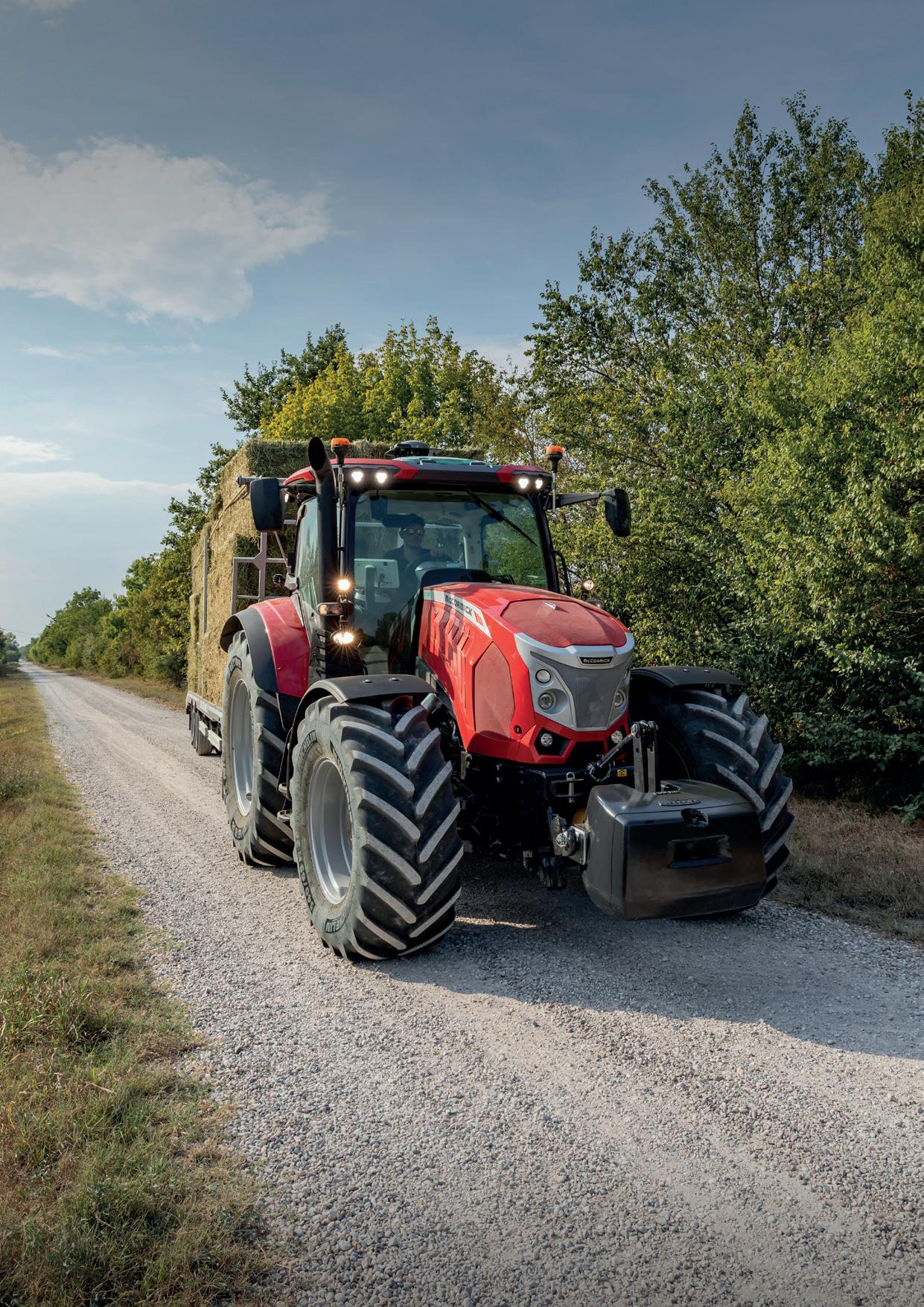
The new X7 SWB from McCormick offers a powerful combination of power and performance in either 4 or 6 cylinder packages. A modern McCormick is packed full of features and technology, built from reliable, proven components. A true workhorse that delivers versatility day in, day out. With tailored warranty and finance packages to suit every farm, why not try a new McCormick?
Speak to your local dealer or call us direct to book a demo on: 01302 757550
NFU Scotland, Rural Centre, West Mains Ingliston, Edinburgh EH28 8LT
NFU Scotland, Rural Centre, West Mains Ingliston, Edinburgh EH28 8LT
NFU Scotland, Rural Centre, West Mains
0131 472 4000 www.nfus.org.uk
Ingliston, Edinburgh EH28 8LT
Tel: 0131 472 4000 www.nfus.org.uk nfuscotland @NFUStweets
nfuscotland @NFUStweets @nfuscotland
Tel: 0131 472 4000
Editor
www.nfus.org.uk
HOW often do you see or learn about something and think ‘I’m up for that’, but then never actually realise that positive thought/ silent commitment? Possibly too often or not at all.
Editor
Diana McGowan editor@nfus.org.uk
nfuscotland
Design & Production
Diana McGowan editor@nfus.org.uk
@NFUStweets
Mark Shreeve mark.shreeve@micropress.co.uk
Managing Editor
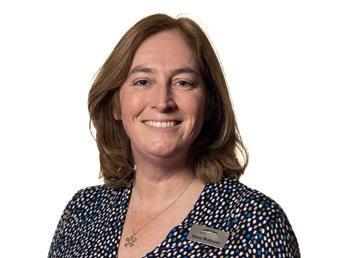
HOW often do you see or learn about something and think ‘I’m up for that’, but then never actually realise that positive thought/ silent commitment? Possibly too often or not at all.
Editor
Andrew Hirst andrew.hirst@micropress.co.uk
Craig Gibson
Advertising Sales
Design & Production
Diana McGowan editor@nfus.org.uk
Ryan Swinney
Danny Lewis 01502 725862 danny.lewis@micropress.co.uk
In this month’s magazine, our two features cover inspiring stories and highlight just how rewarding delivering on such thoughts can be both for the individual involved and others who may benefit along the way.
IAdvertising Sales
Managing Editor
Craig Gibson
Daniel Rice 01502 725858 daniel.rice@micropress.co.uk
Clare Stebbing clare@connect communications.co.uk
In this month’s magazine, our two features cover inspiring stories and highlight just how rewarding delivering on such thoughts can be both for the individual involved and others who may benefit along the way.
Mat Roffey 01502 725854 mat.roffey@micropress.co.uk
Design & Production
Tel: 0131 561 0024
Ryan Swinney
Mark Tait 01502 725803 mark.tait@micropress.co.uk
Advertising Sales
Clare Stebbing clare@connect communications.co.uk
Published on behalf of NFU Scotland by Connect Publications (Scotland) Ltd. Studio 2001, Mile End, 12 Seedhill Road, Paisley PA1 1JS
Published on behalf of NFU Scotland by COUNTRYWIDE PUBLICATIONS
Tel: 0131 561 0024
Fountain Way, Reydon Business Park, Reydon, Suffolk IP18 6SZ 01502 725800
Printed by
MICROPRESS PRINTERS LTD
Fountain Way, Reydon Business Park, Reydon, Suffolk IP18 6SZ 01502 725800
Published on behalf of NFU Scotland by Connect Publications (Scotland) Ltd.
Studio 2001, Mile End, 12 Seedhill Road, Paisley PA1 1JS

We’re only a few weeks away from the Royal Highland Show. Over the course of four days, thousands will flock to the show to compete, judge, exhibit, organise, educate and socialise. We’ll see the best of the best and relish the atmosphere. Among the highlights and away from the main show ring, this year will see the welcome return of the Golden Shears Sheep Shearing and Woolhandling World Championships. Taking place at the MacRobert Theatre, the 2023 Worlds will see more than 30 countries compete for the prestigious title and it promises to be an action packed showcase of the art, skill and techniques required to be a world champion.
recently made a day trip to Newcastle on the train. Once again it was one of those days where the heavens had opened, and rain fell relentlessly from the sky like a power shower…all day. As I gazed out of the carriage window I was expecting to see the sight of flooded fields, but I hadn’t anticipated the extent of the flooding. The lineside land and as far as you could see was saturated with no let up for the entire journey from Edinburgh. In all my years of taking that journey, I don’t recall ever seeing the landscape looking as sodden as it was. We’ve been reporting about the extreme weather you’ve all be experiencing over recent months and the impact it’s been having on businesses across the country but seeing is believing.
We’re only a few weeks away from the Royal Highland Show. Over the course of four days, thousands will flock to the show to compete, judge, exhibit, organise, educate and socialise. We’ll see the best of the best and relish the atmosphere.
Among the highlights and away from the main show ring, this year will see the welcome return of the Golden Shears Sheep Shearing and Woolhandling World Championships.
Perhaps a less well known event taking place at this year’s Highland is the final qualifying round of the 2023 Britain’s Fittest Farmer competition. Taking part in this event for the first time is Kyla Graham from Kirkcudbrightshire. Kyla first spotted the event at the Show last year and while watching it thought ‘I’m up for that’. Kyla knew however she couldn’t just enter there and then. Like any competition, she understood you need to be ready for it and without knowing if she would even enjoy it, she set her mind to it to finding out if she would. Kyla shares her journey from that moment to the present and highlights how she’s benefited already in so many ways both mentally and physically, and explains about the positive impact her preparation has had on her working life.
In my mind, as I looked out onto the flooded fields, I couldn’t help but think how ironic and almost ridiculous it was, that I was finalising this issue of Scottish Farming Leader with a lead feature about ‘being prepared’ for drought conditions. The reality is that almost twelve months ago we were racing towards a period where extraction orders were being considered. While the fickle nature of the weather remains out of our control we must be as prepared as possible for what may come. See pages 28-31 for some guidance on preparing for long periods of dry conditions and where to find out the latest information.
May will mark the 25th anniversary of the Scottish Parliament. This has given the team at NFU Scotland the opportunity to look back at the past quarter of a century to see how NFU Scotland has interacted with parliamentarians and fed into the political debate. Please see our report on pages 42-47 which will hopefully jog a few memories but most importantly illustrate just how much engagement the Union has had with the parliament from its very early days through to the present day – always working in the best interests of Scottish agriculture and you, our members.
3 Editor’s welcome 4 President’s update 6 News
from the Union
The other feature looks at how a casual conversation during a Christmas lunch turned into the most rewarding and humbling experience for Next Generation Chair, Matthew Steel, one of the many volunteers who have recently delivered much needed 4x4 vehicles to Ukraine to support the war effort. Matthew explains his contribution to the ‘Pickups for Peace’ campaign and reflects on how the unexpected reception received from the Ukrainians has impacted him and those who were involved.
Taking place at the MacRobert Theatre, the 2023 Worlds will see more than 30 countries compete for the prestigious title and it promises to be an action packed showcase of the art, skill and techniques required to be a world champion.
Perhaps a less well known event taking place at this year’s Highland is the final qualifying round of the 2023 Britain’s Fittest Farmer competition.
Picking up on the political theme but with more of a focus on Westminster, it’s fully anticipated that there will be a General Election at some point this year, but most definitely within the next nine months. Jonnie Hall’s update on pages 24-26, outlines our key asks of the UK Government ahead of this election and which form the recently launched General Election Manifesto 2024 document that has been put before MPs from across all the main parties. Top of the list is the fundamental need to deliver increased, ring-fenced and multi-annual funding.
Elsewhere in the magazine, you’ll find the usual updates from the policy and regional teams along with the latest news from the Union. I hope you’ll be able to enjoy reading this latest issue somewhere nice and dry!
Taking part in this event for the first time is Kyla Graham from Kirkcudbrightshire. Kyla first spotted the event at the Show last year and while watching it thought ‘I’m up for that’. Kyla knew however she couldn’t just enter there and then. Like any competition, she understood you
Dairy Contract Regulations
Poultry register win for NFU Scotland
21 Visit to SRUC Craibstone Campus
22 SSBSS Reform update
24 General Election 2024: Your Union’s Manifesto for Scotland’s Farming Future
Finally, as we head towards the longest day, with the hope of some warmer weather on the horizon, I hope you’re remembering to dress for the weather and wear protective sunscreen and hat when you’re out and about. The strength of the sun even on a dull day can prove harmful if exposed without protection. If you need a new baseball cap, visit the NFU Scotland website and purchase one from the branded merchandise in the Members’ Benefits section.
‘What to Expect’ Meetings a great
Keeping on top of EAE
Ferries - Ongoing lobbying
FarmTalk 14 The Agriculture and Rural Communities (Scotland) Bill passes Stage One
The other feature looks at how a casual conversation during a Christmas lunch turned into the most rewarding and humbling experience for Next Generation Chair, Matthew Steel, one of the many volunteers who have recently delivered much needed 4x4 vehicles to Ukraine to support the war effort. Matthew explains his contribution to the ‘Pickups for Peace’ campaign and reflects on how the unexpected reception received from the Ukrainians has impacted him and those who were involved.
“We’ll see the best of the best and relish the atmosphere”
Prepare for a Dry Summer
Scottish Parliament 25th anniversary
Finally, as we head towards the longest day, with the hope of some warmer weather on the horizon, I hope you’re remembering to dress for the weather and wear protective sunscreen and hat when you’re out
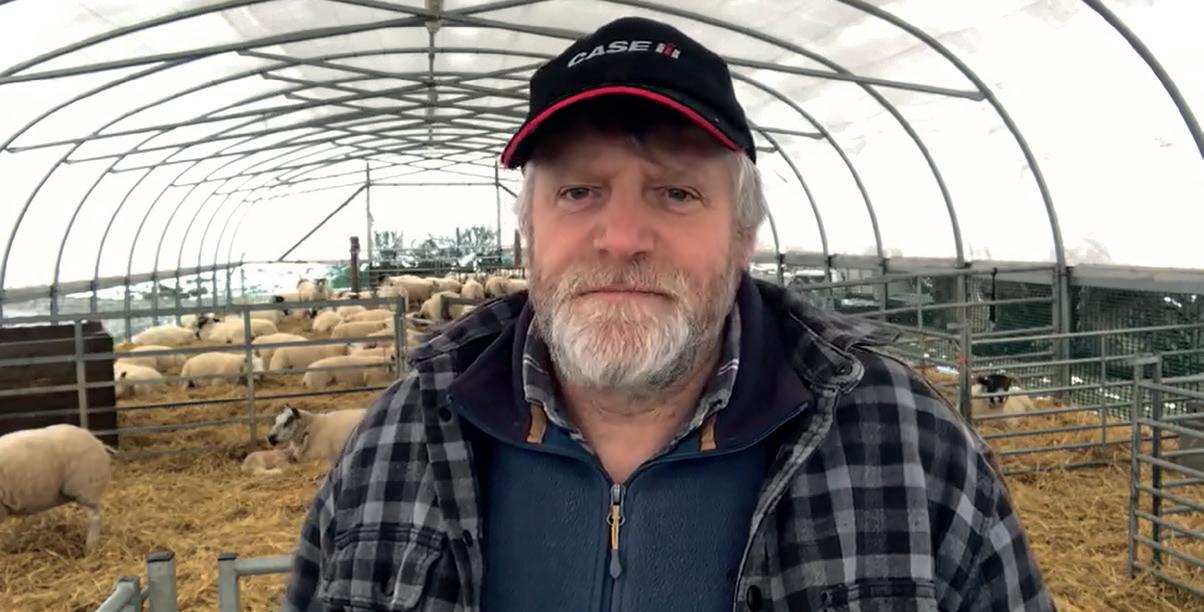 From
From
Keep up to date with all the news on Facebook or follow us on @martinkennedyvp and @NFUStweets
For the weekly news sent to your email, please send your name and membership number to info@nfus.org.uk
It’s hard to imagine that as I write this month’s leader article we are heading towards the middle of April. Usually by this point there has been a serious amount of work done on the land getting spring sowing and planting done and watching young lambs and calves running about in the spring sunshine. Well, nothing could be further from the truth, I certainly cannot remember a spring like this where the land hasn’t really had the chance to recover since last October.
There has been virtually no spring planting done and the incessant rain and indeed occasionally snow have made it extremely challenging for new life on the farm to thrive and indeed survive. The one consolation is we are all in the same boat (if you pardon the pun) right across the UK. In fact, I contacted the other UK farming union Presidents to
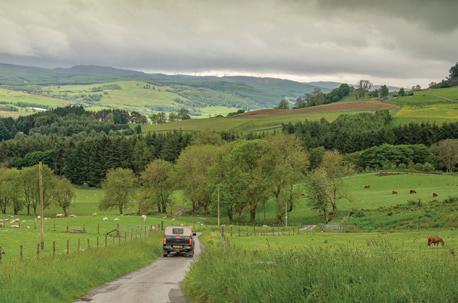
gauge the situation in other parts and it’s very much the same. This is unprecedented as usually some areas escape the worst of the weather.
I hope by the time this is published the weather will have picked up and everyone will be flat out. If not, as I have suggested to the other unions, we’ll have had a joint statement issued highlighting the ramifications and long-term threat this spring will have on not only the profitability of the industry but also the long-term threat this will have on food security.
This is exactly why I keep banging on about Governments getting their priorities right. We all know climate change is having a big impact now. I know this personally as this is the first time in my lifetime that I haven’t had to clear the farm road with the snow plough. But that doesn’t mean we shouldn’t adapt to this change.
I’ve said often that farmers are the solution on so many fronts, but we must be enabled to be that solution, not hampered by
ideological views that are creating half the problem. Beavers are a case in point. Serious damage caused by these rodents have cost the industry and indeed Government millions of pounds. We are in a situation whereby some farmers are now considering whether it’s worth the risk of planting a high value veg crop on land that’s vulnerable to further damage. This is of course exacerbated by other ideological views that stop us from managing our rivers, as we did in the past to everyone’s advantage. Both by protecting prime agricultural land for growing our food and at the same time protecting homes and businesses from devastating flooding.
There’s a UK election just round the corner, we will be doing everything we can to see the key asks we’ve laid out in our General Election Manifesto being understood and included in all prospective parliamentarians’ party manifestos in order to deliver a sustainable and profitable Scottish agriculture sector.
I’ve said often that farmers are the solution on so many fronts, but we must be enabled to be that solution, not hampered by ideological views that are creating half the problem.

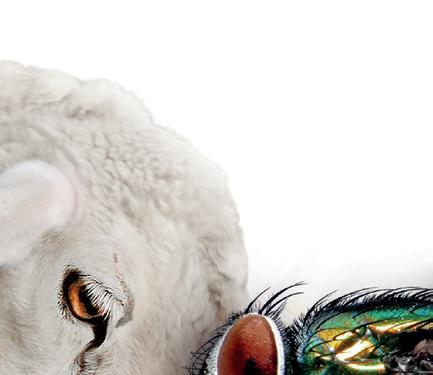
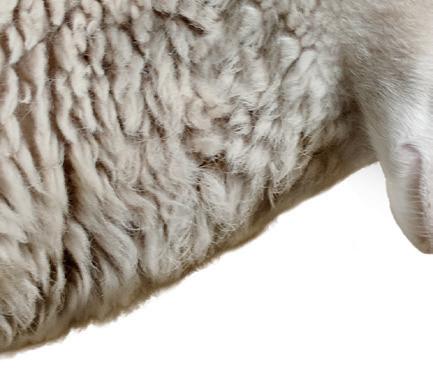
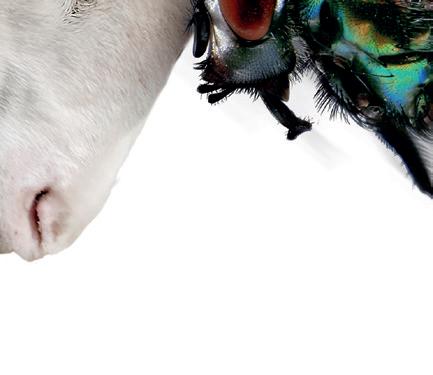
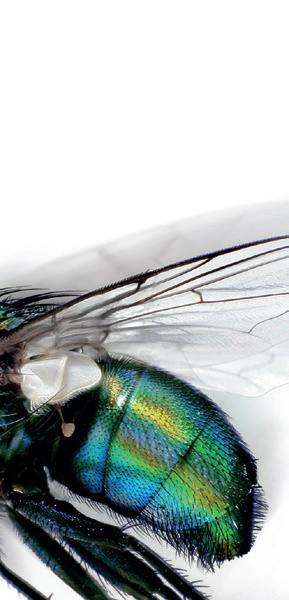




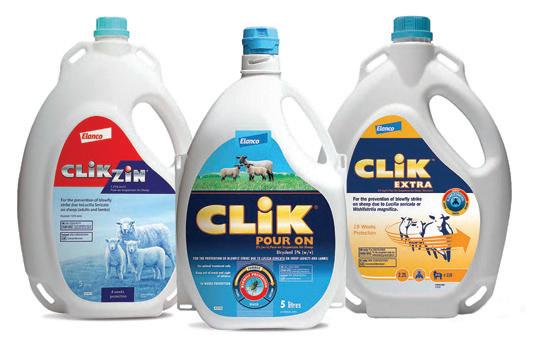
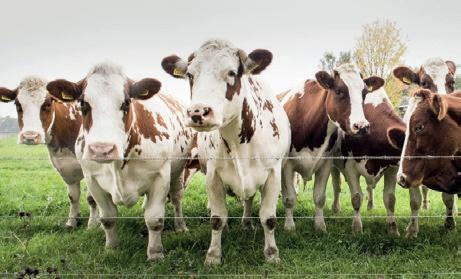
Food Standards Scotland (FSS) is urging farmers to follow fi ve steps to prevent lead and copper poisoning this grazing season. The steps encourage farmers to check farmland for discarded materials, including electric fence batteries and flaking paint, that are sources of lead poisoning, as well as being mindful of the causes of copper poisoning in sheep. If exposed, lead can be highly toxic to cattle, causing severe pain, convulsions, blindness, and can very often be fatal. Unfortunately, some farmers across Scotland have experienced the devastating effects of lead poising on their livestock.
Two weeks after turning out his youngstock, David Warwic, who farms in the Scottish Borders, found three cows had become ill with signs of poisoning, with one of them dying shortly after. The cause of this was a discarded car battery someone had fl y tipped into the hedge and it had then rolled into the field. FSS recommends the following fi ve steps:
• Check that vehicle and fence batteries are stored securely and out of reach of animals.
• Check fields and fences for fl y-tipping before putting animals out to pasture.
• Check buildings and equipment for old lead paint peeling off.
• Check what feed sheep have access to. Some concentrates and minerals are for cattle only.
• Check the supplements are right for your sheep as breeds such as Texel, Suffolk and North Ronaldsay are more susceptible to copper poisoning.
You can fi nd out more information about on-farm incidents on the FSS website: foodstandards.gov.scot
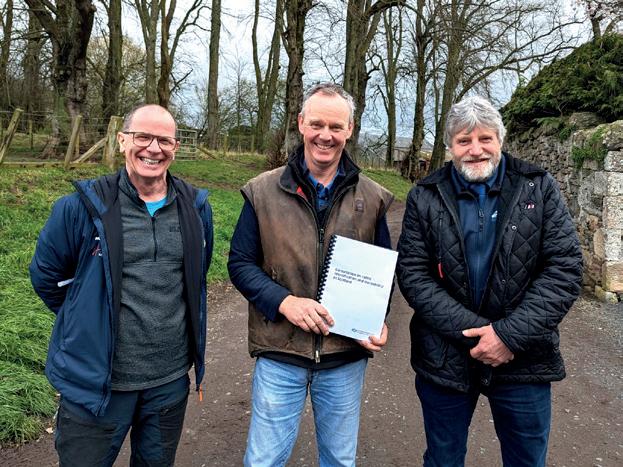
Proposals to modernise how Scotland’s cattle are tagged, identified and traced is the focus of a new Scottish Government consultation that was launched at Robert Neill’s farm in the Borders by Farming Minister Jim Fairlie MSP. Cattle farmers and businesses are encouraged to give their views on plans to fit all new-born cattle with electronic ear-tags. This has long been supported by NFU Scotland, was first mooted more than 20 years ago, and if implemented, Bovine EID can provide cattle keepers with an easier way to collect and store cattle information, leading to improvements in efficiency and safety.
The consultation seeks views on updating the current non-
computerised system with EID, the use of an online register for cattle, and the removal of paper cattle passports for EID identified animals. President Martin Kennedy, who attended the launch event said; “We welcome the long-awaited sections in this consultation relating to the use of Bovine electronic identification (EID). Scottish farmers and crofters have been supportive of the introduction of electronic identification for decades. In the future, the industry will rely heavily on data to manage our herds’ efficiency and productivity, and to deliver against ambitious environmental goals making Bovine EID crucial. We hope that this consultation will finally progress the introduction of Bovine EID, and will negate the need for paper passports, offering both industry and government a significant saving.”
Scotland’s budding food and drink stars are being encouraged to enter NFU Mutual’s ‘Inspirational Young Person Award’ – with nominations now open. The award, launched by the Mutual in partnership with Scotland Food & Drink, is now entering its sixth year and aims to uncover and reward talented 16 to 26-year-olds who own, work or study in the food and drink industry. Entries and nominations have opened for the award, which not only highlights the innovation that young people
bring to Scotland’s food and drink businesses, but also the important contribution they make to the sector.
First, second and third-place winners will be awarded cash prizes of £500, £300 and £200 respectively, and will be announced this September.
The NFU Mutual and Scotland Food & Drink Inspirational Young Person Award 2024 is open for entries until 12 July. Submit your entry or make a nomination visit www.nfumutual.co.uk/ campaigns/inspirational-youngperson-award
RSABI’s flagship annual outdoors team event, the Great Glen Challenge, is returning for 2024 and for the second-year running will be sponsored by our legal helpline providers, Gillespie Macandrew.
Last year’s event, which saw three teams made up of NFU Scotland staff and Board members, raised over £50,000 towards to support the work of RSABI which provides practical, emotional, and financial support to people in Scottish agriculture. The 2024 event hopes to surpass that amount.
The Great Glen Challenge 2024 will take

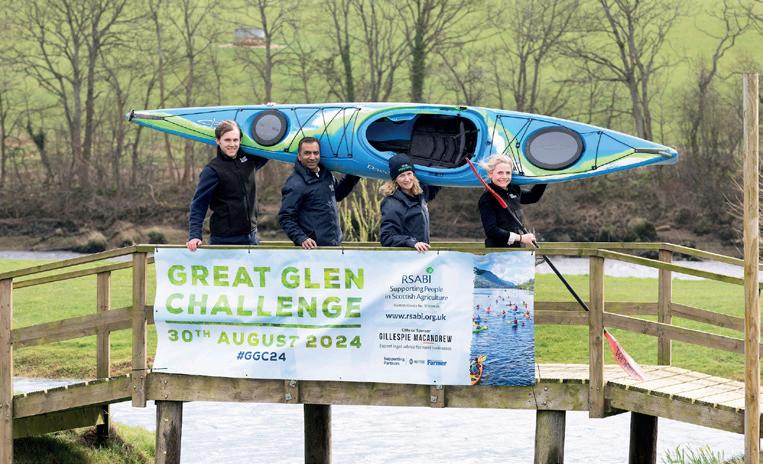
place on 30 August, when competing teams of four, plus a support driver, will take on the multi-sports event, with four designated stages (a 49km mountain bike, 6km kayak, 18km walk, and 17km run) set out on a scenic route between Fort Augustus and Fort William.
Registration for the event is now open and RSABI is seeking dedicated teams to help reach its fundraising target while raising awareness of the vital services it provides, including its 24/7 Helpline, 0808 1234 555, free counselling and mental health first aid training. For more information and to sign-up for the event visit www.rsabi.org.uk.
An industry wide review of farm-to-fork assurance has been officially launched with the announcement of the independent commissioners panel which will oversee the review. The independent review has been jointly commissioned by NFU Scotland, NFU, NFU Cymru, UFU and AHDB who will all form part of the Assurance Review steering group. The group is in the process of appointing four commissioners who will be responsible
for setting the terms of reference and a timeline. Three of the four commissioners have already been appointed, who are Dr David Llewellyn CBE (lead commissioner) - former Vice-Chancellor of Harper Adams University; James Withers – former Chief Executive Officer of Scotland Food and Drink and NFUS CEO; Mark Suthern – Chair of Trustees of the Farming Community Network (FCN). The review will examine: How farm assurance can deliver value back
to scheme members; How standards are developed to meet the evolving needs of members, the markets they serve, sector diversity and in appreciation of the global marketplace; How assurance members are engaged with (including the development of standards), inspected and how technology is used in assurance now and in future; How assurance schemes can and should fit with regulation and government schemes to best serve members.
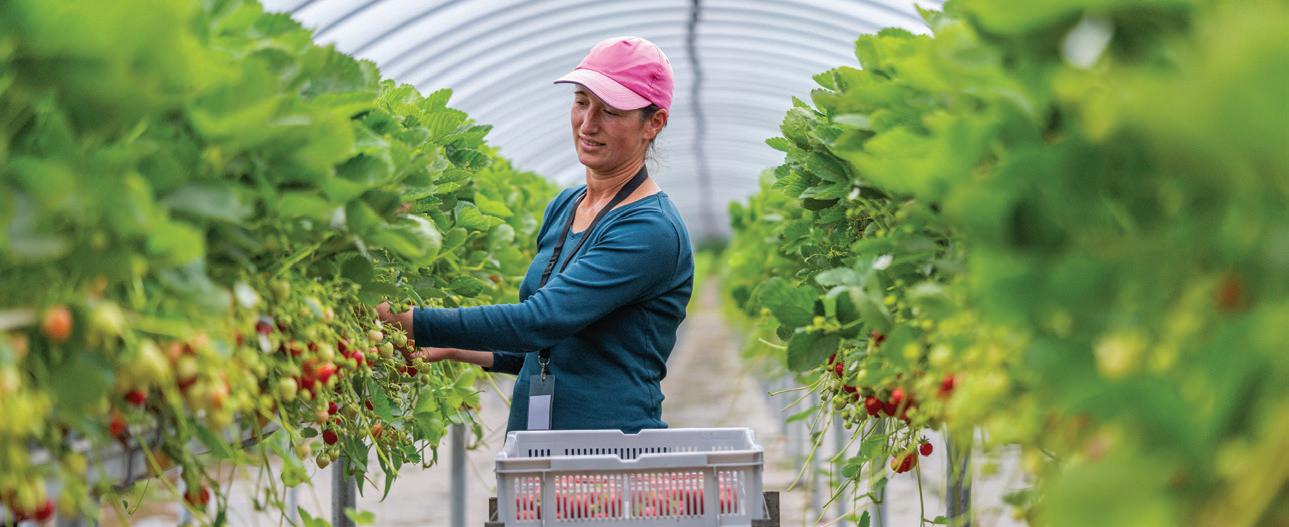
Created for industry, by industry. ‘Naturally Scottish’ is our new food and drink sector brand. With NFUS a vital member of the Scotland Food & Drink Partnership, we’re eager to take this opportunity to introduce you to ‘Naturally Scottish’.
The brand was chosen for its bright, modern look and feel that accurately reflects the people and passion behind Scotland’s food and drink sector. Our food and drink is world-renowned. And the provenance, the place, and the people all play a part in making it what it is. We visited 15 producers from all over Scotland, including some incredible primary producers, each captured in their element.
There is great ambition to bring Scotland’s impressive larder to the global stage on a scale that hasn’t been fully invested in before. You may have started to see ‘Naturally Scottish’ shining bright at events and as part of our industry strategy work. From here on, it will form the backbone of our industry’s identity at trade shows, activations, and across digital media. Anywhere that we’re selling Scottish.
This brand has huge potential, and we can’t wait to share it with the world.

Watch our video to find out more


Congratulations to NFU Scotland’s Gemma Cooper and Jackie Sauders and the rest of those who have recently graduated from the latest Growing Tomorrow’s Leaders programme.
Gemma and Jackie are the fourth graduates from NFU Scotland to successfully complete this leadership course, led by SAOS, with the search now on for the 2024 course
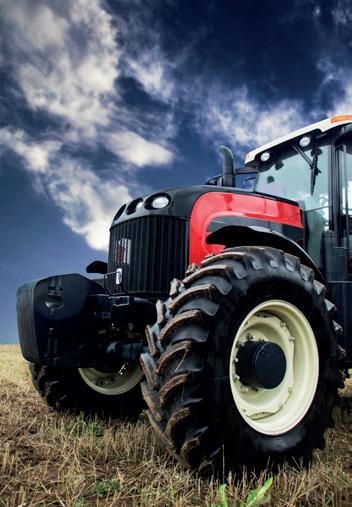
participants. Now entering its third year, the programme equips ambitious individuals from a diverse range of backgrounds including large rural organisations, farmer-owned co-operatives, SME’s and the selfemployed, with the essential tools to navigate an ever-evolving industry. Developed in response to the pressing need for resilient leadership within Scotland’s rural and agricultural
Agriculture has the worst rate of deaths and injuries per 100,000 workers of all sectors in Great Britain. Injury by animal is the most common cause of death in the most recent farming statistics published by HSE. Whilst calving is underway for many livestock farmers, it is highlighting key safety advice to prevent injuries in its working safely with livestock checklist and provides advice for three key areas:
• ‘The handler’ should be trained and supervised until competent; be agile and in good health. Handling tasks should be planned in advance and incorporate safe ways of working.
landscape, the programme nurtures fl exible mindsets, establishes mutually supportive networks, and fosters innovative thinking among participants. The programme’s success is made possible through collaborative eff orts and sponsors include NFU Mutual and NFU Scotland. Those interested in applying for the 2024/25 programme can fi nd out more and apply at by visiting saos.coop
• ‘The equipment’ such as the crush, race, calving pens, yokes, gates etc should be suitable for the tasks carried out and be arranged and used so that people and cattle are kept apart as much as possible. Equipment should also be well maintained and work properly – all the time.
• ‘The animal’ should be handled with respect. Bulls can be territorial and cows with calves can be very protective of their young. Consider having bulls ringed at about 10 months, and always use handling aids when moving them. Stock bulls should be kept in purpose made bull pens which meet specific requirements. Farmers should consider culling animals that are habitually aggressive or difficult to handle.
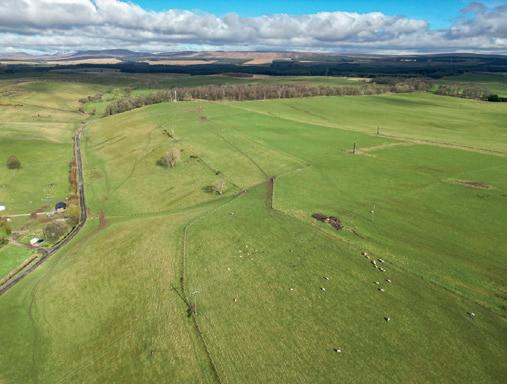
Auchinlay Holdings, Dunblane
A rare opportunity to acquire a smallholding in picturesque Dunblane. Cottage, outbuildings and land extending to 16.96 Ha (41.93 acres in all)
Offers over £490,000

Land at Old Plean, Stirling
An open site within a village location extending to approximately 3.03 hectares (7.49 acres). The lower field sits within the village settlement line on the local development plan.
Offers over £350,000
Contact us for more information
T 01786 833 800
E rural@dmhall.co.uk
dmhall.co.uk
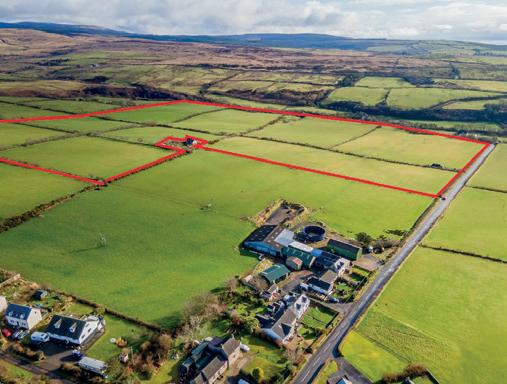
Lot 2 Bellevue Farm, Arran
Land extending to approximately 25.35 Ha (62.64 Acres), Offering good grazing and is well drained and well managed. The land is predominantly Class 4.1 for agriculture and class F4 for forestry.
Further lots available. Guide price £200,000
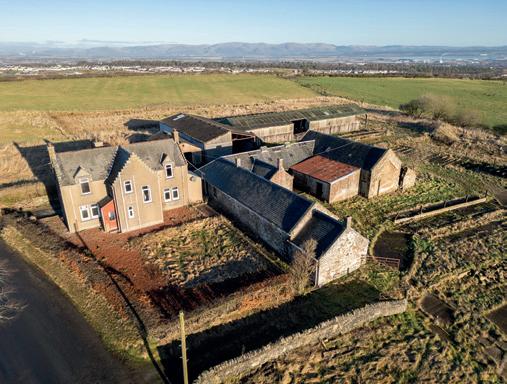
Wester Pirleyhill, Fallkirk (UNDER OFFER)
Development opportunity:
A compact smallholding with a farmhouse, multiple outbuildings and land parcel.
Offers over £325,000



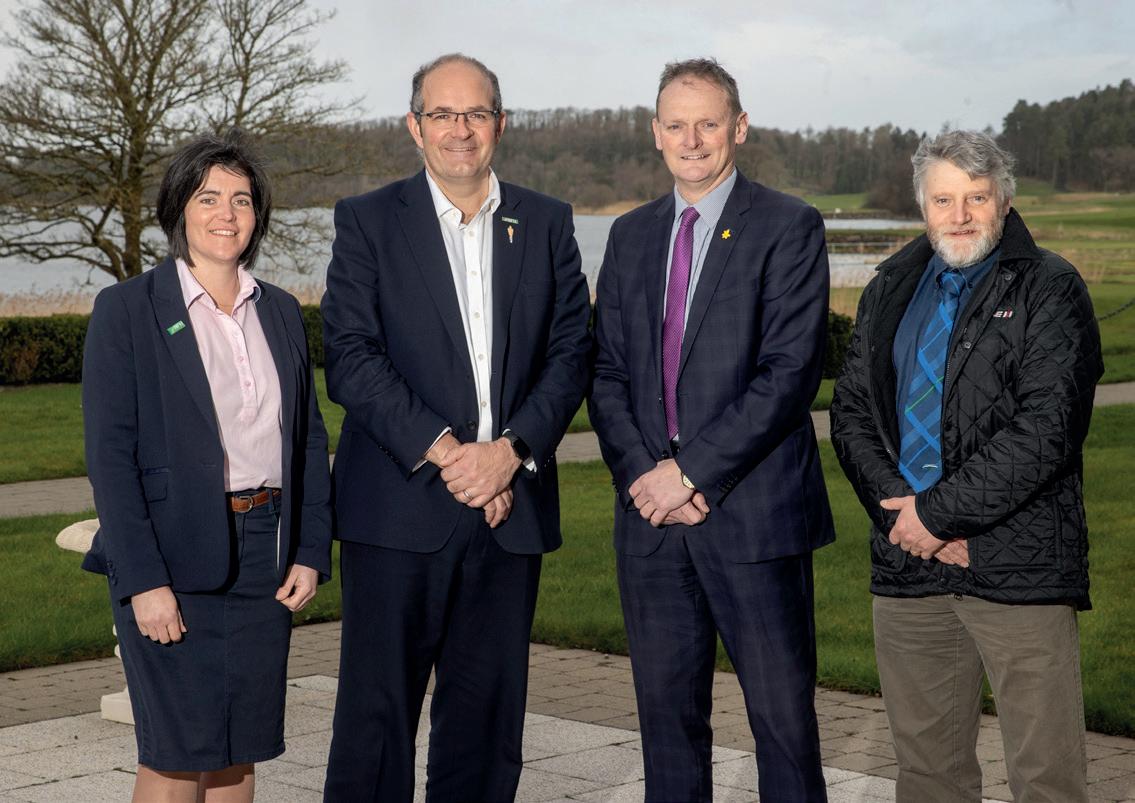
At the recently held annual UK farming unions summit, hosted by the Ulster Farmers’ Union (UFU) at the Lough Erne Resort, Co. Fermanagh, NFU Scotland, UFU, NFU and NFU Cymru, alongside the Irish Farmers’ Association (IFA), stressed the need for Governments to back farming and food production. In a joint statement, the UK farming unions said, “To safeguard our nation’s food security we need to build profitability and resilience into our farm businesses. This requires a closer partnership between farmers and politicians, so we can continue to produce the high-quality food that consumers expect, while delivering for the environment and economy. Across the UK, there must be a balanced approach at a policy level, not just to look at the environmental side of agriculture, but at the economic and social consequences of agricultural production. Farmers cannot be sacrificed for other societal objectives. They are essential to a healthy world and a healthy population.”
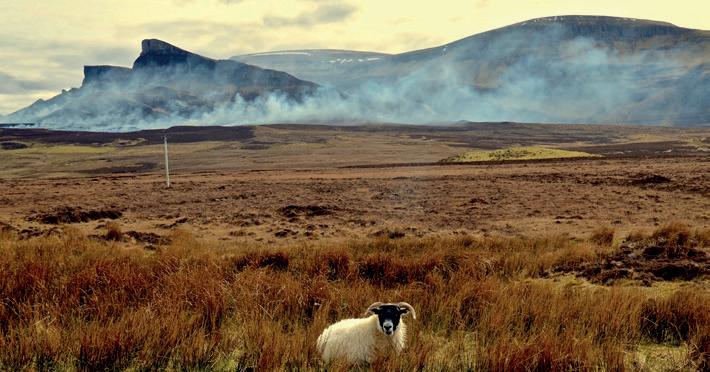
The Wildlife Management and Muirburn Bill has been passed by Parliament. The Bill includes a range of measures that aims to help tackle raptor persecution, and ensure that the management of species on grouse moors is done so sustainably and with animal welfare as a priority.
The Bill:
• bans the practice of snaring in Scotland.
• bans the use of glue traps to catch rodents.
• gives greater powers to Scottish SPCA inspectors to tackle wildlife crime.
• introduces a new five-year licensing framework for grouse moors.
• strictly regulates the use of muirburn, the controlled burning of vegetation on peatland.
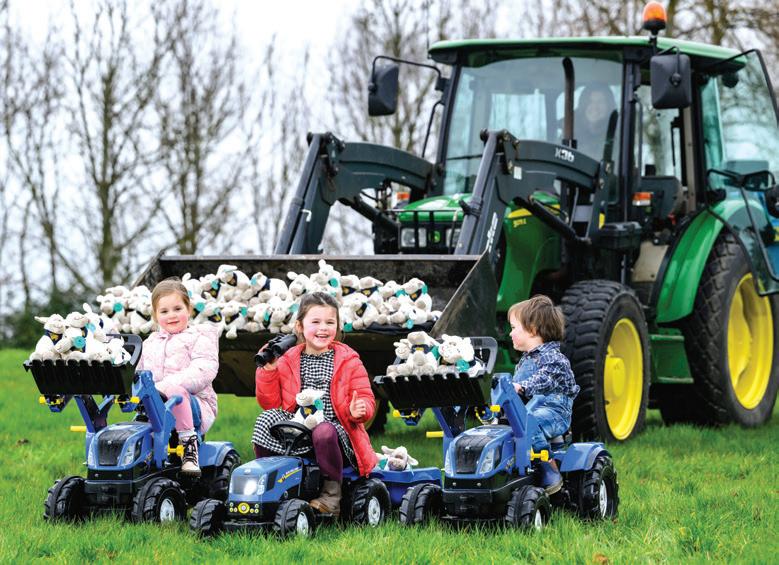
The hunt is on to find almost two thousand cuddly sheep hidden across Scotland and to have a chance to win a VIP experience to this year’s Royal Highland Show.
RHASS hid 1,920 cuddly toy sheep across Scotland this Easter in the fi rst of a year-long programme of events to celebrate its 240th anniversary. The free family fun event saw the cuddly fl ock safely stowed away at shopping and tourist destinations, farm shops and agricultural centres across across the country.
Anyone lucky enough to find one of the
lost flock first can keep it and be in with the chance of winning one of eight VIP experiences at the Royal Highland Show 2024. They simply need to scan the QR code on the sheep’s ear tag to discover if they are a winner.
Each ear tag code will also reveal five farming facts including insights on lambing, crop sowing and more, as well as raising awareness about the farming sector and the important issues facing the rural community.
For more information on Hide & Sheep please visit www.royalhighlandshow.org
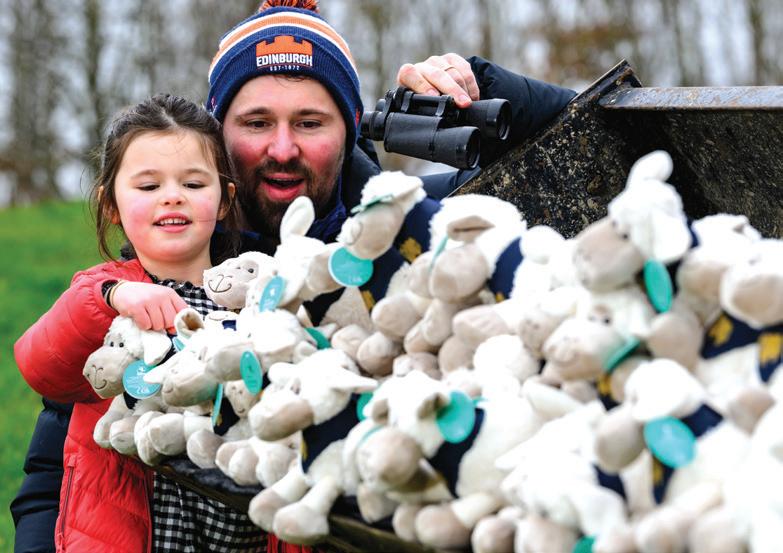
The closing date to get your Single Application Form submitted is 15 May. Don’t leave it to the last minute to apply for various support schemes. Visit the ruralpayments.org website for more details.





The 28th Agricultural Wages order came into effect on 1 April. The guide which details the minimum hourly rates of pay and other terms and conditions for agricultural workers in Scotland can be found at: Agricultural Wages in Scotland Twenty Eighth Edition: A Guide for Workers and Employers (www.gov.scot) https://shorturl.at/lHIM2



 Beatrice Morrice
Beatrice Morrice
Political A airs Manager
The Agriculture and Rural Communities (Scotland) Bill passed Stage One following a debate in the Scottish Parliament at the end of March. Over recent months, NFU Scotland provided both oral and written evidence to the Rural Affairs and Islands Committee and sent MSPs a briefing on its key asks ahead of this debate.
We received several mentions and many key points from our briefing were highlighted by MSPs from the SNP, Labour, Conservatives, Greens and the Liberal Democrats. There was overwhelming support for the need for a multi-annual funding commitment going forward and Cabinet Secretary for
Rural Affairs, Land Reform and Islands Mairi Gougeon MSP highlighted that there would be no cliff-edge for farmers and crofters.
Other key points raised during the debate included the need for investment in infrastructure, more details on policy and the costs required, and any future Continued Professional Development must be proportionate and delivered locally.
NFU Scotland continues to closely collaborate with MSPs and Scottish Government as the Bill progresses through the parliamentary process on to Stage Two.
The debate can be watched online at www.scottishparliament.tv
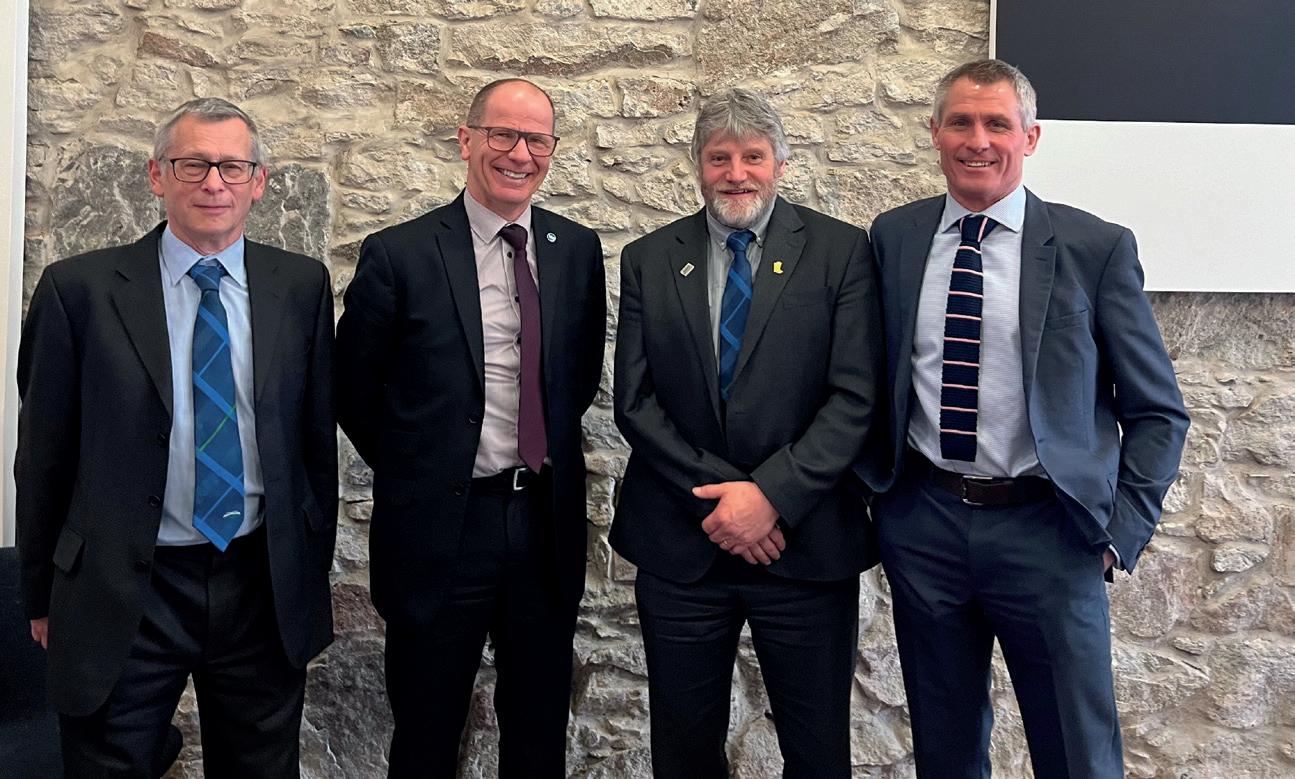
We met with Jim Fairlie MSP, Minister for Agriculture and Connectivity towards the end of March. At our first official meeting with the newly appointed Minister, Martin Kennedy, Alasdair Macnab, Jonnie Hall and Beatrice Morrice discussed future funding for the sector, species and river management.



Our Farm Business Consultancy team provides a range of services including strategic farm business management, evaluation of subsidies and grant applications (IACS/SAF) and ongoing advice relating to the new subsidy regime, including carbon auditing and nutrient planning.











Galbraith has expanded its Farm Business Consultancy team to continue to support and advise existing and new clients throughout the UK through the uncertainty surrounding the future subsidy regime and fluctuating commodity prices.
Our rural team now numbers 78 staff covering land and farm sales, land use management, forestry, natural capital and biodiversity, renewable energy, utilities, tenancy negotiations, farm valuations and property advice for landowners throughout Scotland and across the North of England.
• Farm Business Consultancy
• Subsidy Advice - IACS (SAF)
• Building Consultancy
• Forestry & Woodland Management
• Estate, Farm & Forestry Sales & Acquisitions


• Estate & Farm Management
• Farm Carbon Audits
• Natural Capital, Carbon & Biodiversity Farms
• AMC Finance
• Renewables & Utilities
• Residential Estate Agency
• Valuations










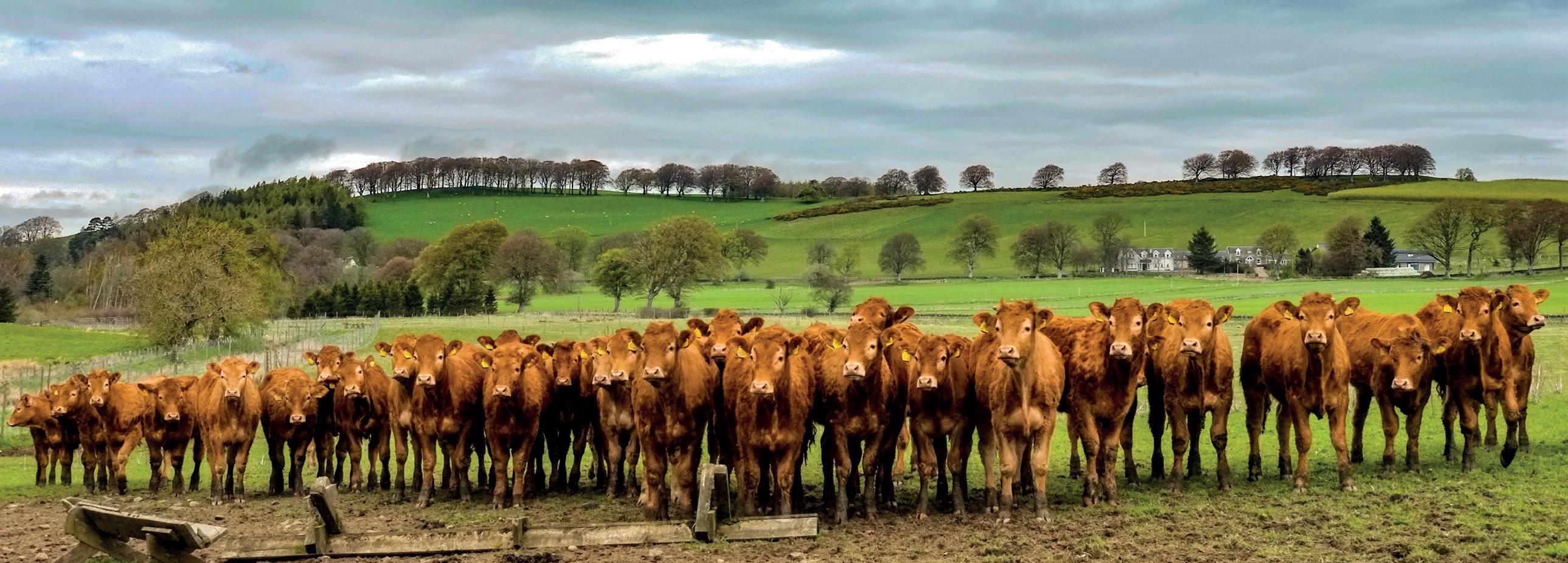
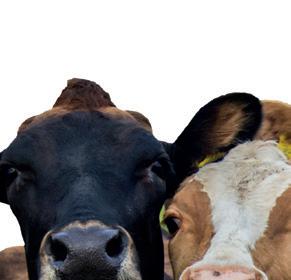
After more than a decade of campaigning from the NFU Scotland and other UK farming unions calling out unfair practices in the dairy supply chain, new legislation on dairy contracts was laid out before Parliament on the 21 February.
If the next stage of the process goes to plan, there will be an implementation period of three months before new contracts must be complaint. Following this there will be a period of a further 12 months before existing contracts are to be compliant.



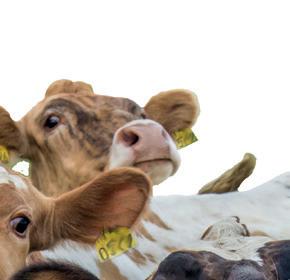
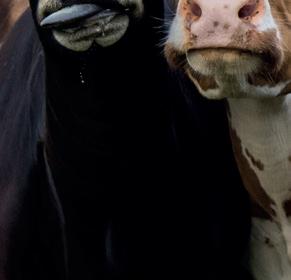

The legislation, known as the ‘Fair Dealing Obligations (Milk) Regulations 2024’ has now been debated and passed by both the House of Lords and Commons.
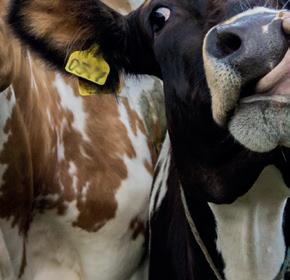



We are expecting the new regulations to be in force for the whole industry around summer 2025.






We will be developing a much more detailed briefing on the exact terms of the legislation, along with producing materials to assist our dairy members in navigating the regulations.



 Tracey Roan Policy Manager
Tracey Roan Policy Manager

• Applies to all farmgate milk contracts.
• It covers all cow’s milk sold by a dairy farmer to a milk buyer – it does not extend to non-cow’s milk products such as goat’s milk.
• Contracts can be for a fixed period or may be ‘evergreen’ agreements. They must state which of the two types they are and the date at which the obligation to supply milk starts.
• The Regulations set out that that milk price can be fixed, variable or a combination of the two.
• Multiple fixed prices can be set for different periods but, where this is the case, it must be clear which price applies to which period and set start and end dates of each period. They must also set out how prices are to be reviewed in exceptional market conditions.
• Prices cannot be changed more often than once a month or less frequently than three months under variable-price contracts.
• When varying the price, only factors set out in the contract can be considered.
• Farmers can ask for an explanation of how a variable price was reached and what factors were taken into account. The processor must respond to this within seven days and allow an independent third party to examine how a variable price was arrived at.
• The regulations will not directly legislate what prices should be and will not, for example, introduce minimum prices.
• Exclusive contracts (where a farmer must send every single litre they produce to a processor) will be prohibited where the milk contract is for a fixed volume. It will also not be possible to have tiered pricing in an exclusive contract.
• Exclusive contracts cannot fix the volume to be supplied or penalise a supplier delivering more than a certain amount of milk. For example, if a processor pays 40ppl for one million litres of milk and 30ppl for any milk over this amount then this would be deemed as tiered pricing and the farmer would have the right to sell milk
• Fixed volume contracts must set out upper and lower acceptable supply limits, such as the base volume plus a tolerance, which will still be paid for the fixed volume price. These contracts must be for a volume to be supplied over a period of no longer than 12 months, must state the fixed volume and acceptable supply limits above and below that which will be paid for at the fixed-volume price.
• Where a milk supply contract is being terminated, farmers must be given at least 12 months’ notice unless they are in breach of the contract or they agree to an alternative period.
• Farmers must give a maximum 12 months’ notice to the processor.
• The regulation allows a farmer to terminate more swiftly in certain circumstances, such as when a milk buyer misses payments for milk or is insolvent.
• Processors must consult with farmers on any contract changes, these must be agreed in writing and cannot be enforced without the farmer’s agreement, or that of their producer representative.
• Contracts must include a 21-day cooling-off period, with no penalty or liability if a farmer decides during the 21 days not to continue with it.
• Contracts must contain a dispute resolution process so that farmers can complain to the processor, who must investigate and resolve the issue.
• A farmer has the right to refer concerns about contracts which may breach the regulations to the Secretary of State.
• There will be an Agricultural Supply Chain Adjudicator appointed to check that processors are complying with the regulations on behalf of the Secretary of State.
• The Adjudicator will be able to fine processors up to one percent of their turnover and/or order compensation to be paid to a milk producer when a processor breach has been found.





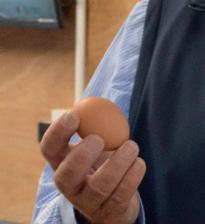
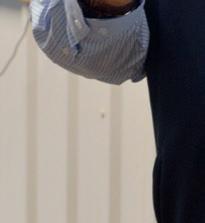
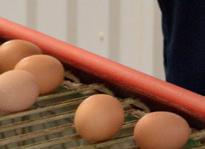


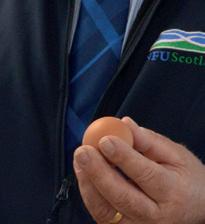














 Penny Middleton Policy Manager
Penny Middleton Policy Manager



Following a long-running campaign effort, driven by the continued threat of Avian Influenza to Scottish poultry, we’ve welcomed the announcement that there is to be a new mandatory requirement on all bird keepers, large or small, to register their flocks. We’ve long been calling for the UK and Scottish Governments to review the current poultry register and make it fit for purpose. Currently only flocks of more than 50 birds are required to be registered, whilst many much smaller backyard flocks exist and have potential impacts on
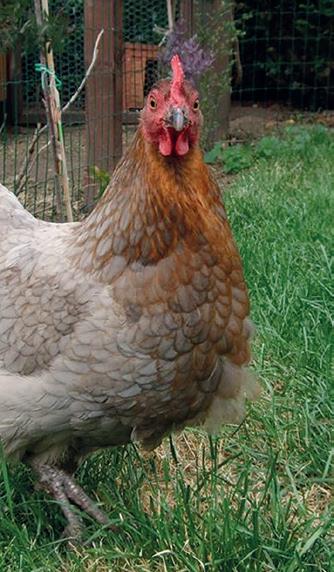
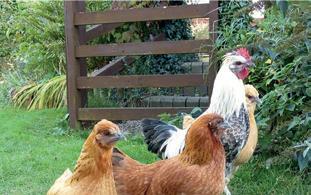
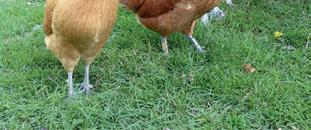
including keepers with commercial poultry flocks. By registering, owners will receive crucial updates and guidance for bird care, including any disease alerts and depending on the threat from Avian Influenza, potentially housing orders.
disease control.
From 1 September 2024, anyone, even if they only have one bird outdoors, will need to register.
Poultry Working Group Chair, Robert Thompson, said: “The unprecedented Avian Influenza outbreak in October 2021, and year-on-year cases since then, highlighted the importance of a proper poultry register. We’re delighted that Scottish and UK Governments have committed to implementing a register that all bird keepers must keep updated. It’ll be an online resource and simple to use,
“During previous Avian Influenza outbreaks, it’s been very difficult for official vets to communicate directly with small backyard keepers to make them aware of temporary heightened disease control measures designed to protect public and animal health and the wider economy.
“Having accurate records of where all poultry are kept will simplify surveillance in disease control zones, helping eradication, reducing the labour needed to demonstrate disease freedom and allow affected areas to be lifted more quickly out of any restrictions.
“That will allow us to help keep all flocks, big and small, as healthy as possible.”
Unlike other business water retailers, our quotes don’t have hidden retail fees in the small print, and we don’t do exit charges. We have more 5-star customer reviews and more directly employed meter readers than any other UK water retailer.
We give all businesses the best deal on their water services, but we pay special attention to groups that have previously been left out of the benefits of the competitive water market in Scotland. That’s why we chose to partner with NFUS.
We’ve offered member rates to NFUS members for 10 years, and we estimate that we're currently saving NFUS members £39,000 on their annual business water bills.
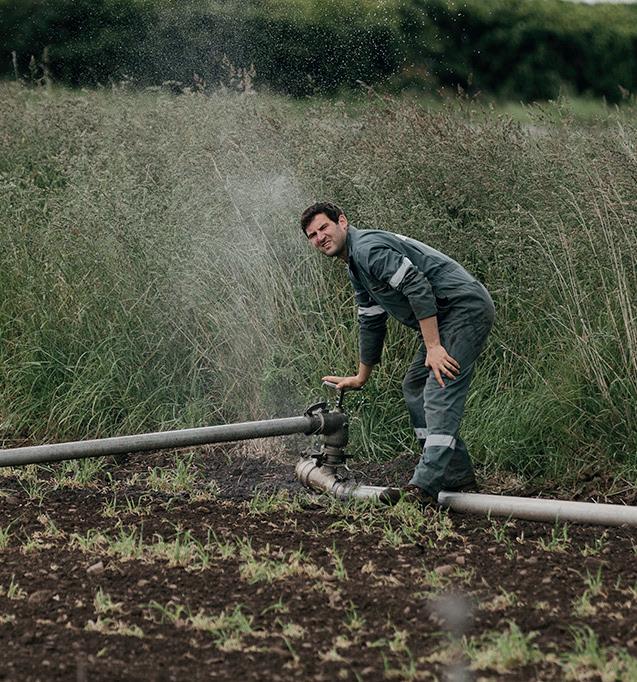
Discounted NFUS member water rates
All we need is a few details about your business and our Scotland-based team will handle the switch for you
Visit castlewater.co.uk/nfus to get a quote

To find out how we can protect what matters most to you, search ‘NFU Mutual Farming’ or contact your local agency.
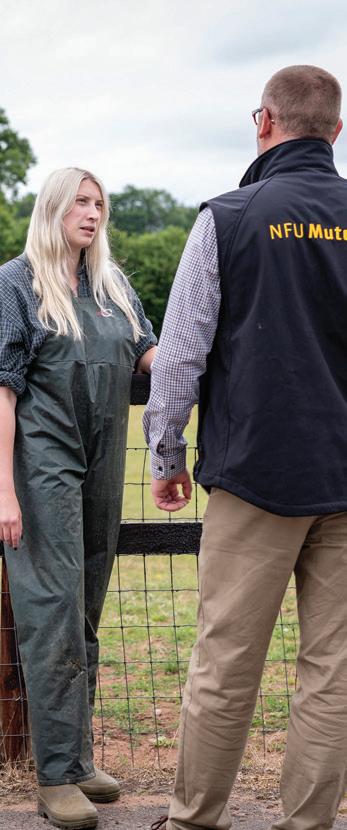
Covering small farms, large farms and everything in between.
Provided by NFU Mutual Agents, located in rural towns and villages throughout the UK.
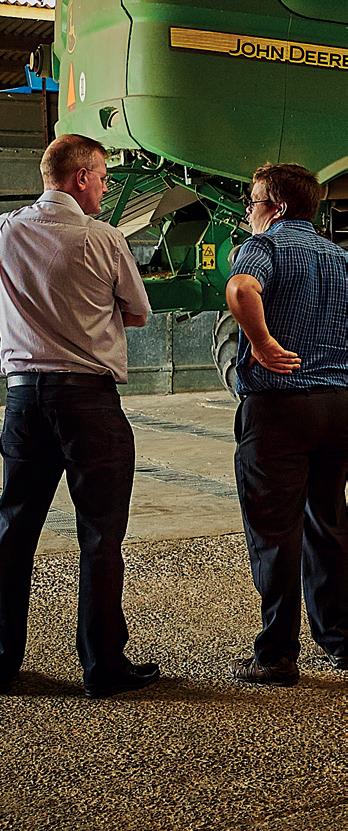
for everyone’s safety.

planning From pensions to investments, life cover to business protection, we’ve been helping customers with their financial planning needs for 95 years.
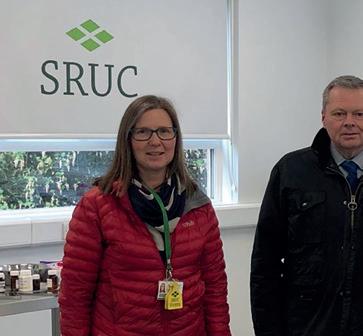
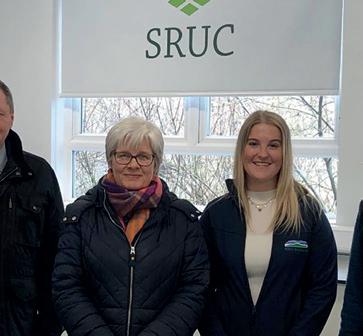
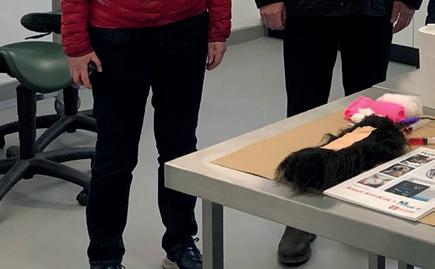
In many of the recent Leader copies, I’ve been speaking about the informal consultation on Tier 4. Finally, our response to this consultation has been submitted to Scottish Government and can be accessed on the members’ section of our website. Many of the issues we identified came up in discussions we had during a recent meeting with the SRUC Aberdeen campus team at Craibstone. Our packed agenda included updates on research, agricultural curriculum, vet school and from us at NFU Scotland.
Within the update on research, we discussed PHD student projects, with lots of research projects being on very topical issues in agriculture. We’re going to work
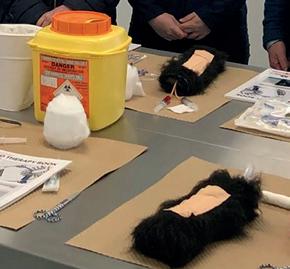
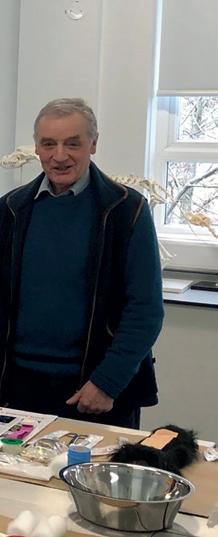



 Lucy McGillivray Policy Assistant
Lucy McGillivray Policy Assistant

with SRUC to see how they can share more information about such projects with you.
During a tour around the new vet school facilities, we heard how SRUC School of Veterinary Medicine will use innovative teaching methods and curriculum design to ensure students are fully prepared to work in demanding sectors. New pathway programmes are aimed at those from rural backgrounds who are familiar with the agricultural sector but may not have - or been able to get - the required scientific foundations. We are all aware of the shortage of vets in our sector, and the new vet school will certainly help. Visit the ‘Study with Us’ section of the SRUC website for more information.



 Rhianna Montgomery Policy Advisor
Rhianna Montgomery Policy Advisor
It’s important to remember your responsibility when it comes to mud on roads, especially during busy seasons. You, the farmer, must ensure that every precaution is taken to ensure that mud or material from fields is not deposited on the road.
Whilst it is expected that, during normal cultivating and harvesting operations, some mud may inevitably end up on the road, it’s important that the following guidelines are followed.
• Mud, deposited by tractors and/or appliances when on public roads, should be removed as soon as practical or at least at the end of the working day.
It was great to get an overview on the modern and pre-apprenticeship, and HNC, HND and degree courses. These are really popular programmes, so SRUC are always in need of farmers and business owners willing to become a mentor, take on an apprentice, or provide work placement opportunities. To create a pipeline of talented labour, industry needs to do its bit. If you are interested, please get in touch with me or contact your local SRUC campus or machinery ring.

• Do everything possible to prevent mud being deposited on the road. This includes cleaning mud from vehicles, as far as practicable, before they are taken onto the road.
• If there is a danger of mud being accidentally deposited on roads, use authorised ‘Slippery Road’ signs with a ‘Mud on Road’ sub plate to alert other road users.
• ‘Mud on Road’ warning signs should be placed at the extremities of any fouling of the carriageway and signs should be fi tted with flashing beacons on ‘A’ Roads.
• Make sure signs are positioned to give maximum visibility and warning to other road users.
• Keep a written record of your decisions on whether or not to deploy signs and/or to clean the road.
• Where a contractor is used, ensure that prior agreement is reached on who is responsible for mud on road issues (signage, cleaning etc).
• Be prepared to hire in equipment to clean up accidentally deposited mud –check availability in advance.

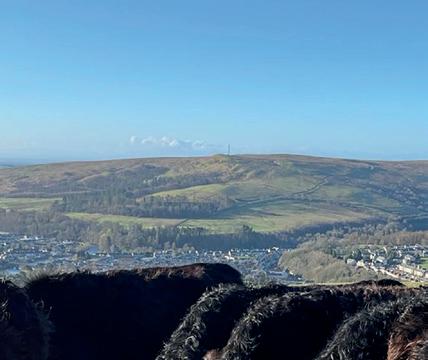
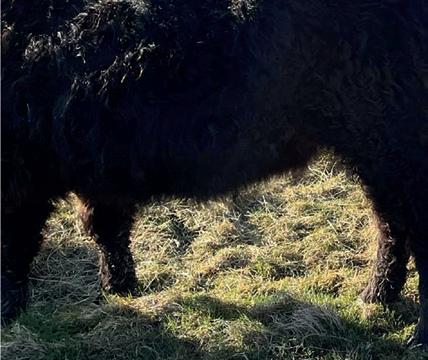



 Lisa Hislop Policy Advisor
Lisa Hislop Policy Advisor
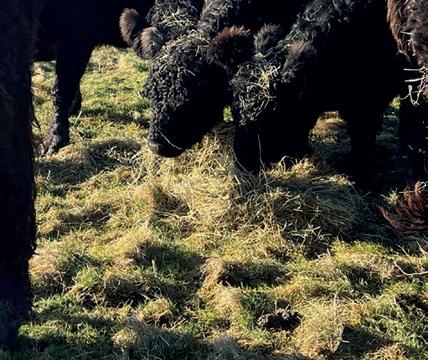
In late March the Scottish Government published some of the long await details for the calf scheme reform.
It was confirmed that from 2025 calves will only be eligible for the SSBSS payment if the dam’s calving interval is 410 days or less. This is in addition to the exisiting eligibility criteria which is currently a requirement to have at least 75% beef genetics and be held on the holding of birth for at least 30 days.
It was also confirmed that the calving intervals will be established based on ScotEID calf registrations, there will be no administrative penalty for any calves which do not meet the calving interval. Meaning the farmer or crofter does not need to calculate the interval prior to submitting the claim. Furthermore, heifers will be exempt from calving





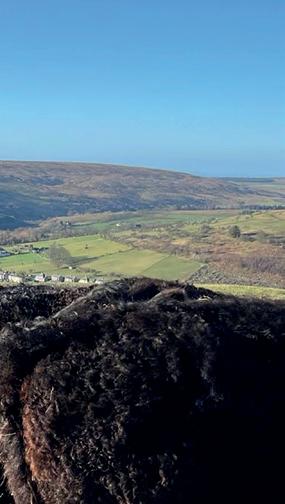
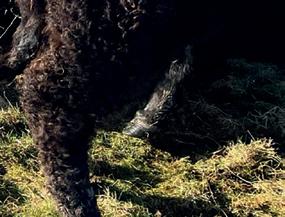
interval conditionality and that Scottish Government intend to continue this scheme until at least 2028.
This follows the Cabinet Secretary’s announcement at last year’s Royal Highland Show in June 2023. We have actively engaged in the reform process and underlined our position as informed through the Livestock Committee. We were clear that we wanted to see the existing £40 million budget retained including the distinct island budget, which has been confirmed by Scottish Government on numerous occasions.
We were also strongly in favour of a split payment approach to provide an element of stability so that claimants could get a proportion of their payment by meeting existing eligibility
requirements and a “top-up” for meeting the calving interval. However, this has not been adopted by Scottish Government.
It’s worth noting that the full scheme guidance is still to be published. We’ve pressed that this guidance must include a clear system for force majeure for those instances outwith your control.
While there’s no change to the scheme this year, it’s important to note that this year’s calf registrations will act as the trigger for the next calf’s calving interval and in turn, their eligibility. We remind members of the statutory requirement to record all calf births within 27 days. We would encourage members to look at their own calving interval on MyHerdStats, accessed via ScotMoves+.
As I write, it seems the cold wet weather shows little signs of abating. I hope that by the time you are reading this the weather has turned and that lambing, calving and spring land work has happened in much better and kinder conditions. I am ever the optimist that things balance out, so fingers crossed.
It seems we are very much in a phase of “up horn” at the moment with store and finished livestock prices reaching unprecedented levels. If that continues and knocks
on into the breeding livestock market, then it could have a real knock-on effect on those seeking to take up opportunities in terms of their ability to secure funding at reasonable rates.
Regarding that, I was pleased to have the opportunity to meet with Andrew Laird and Craig Hillis from Anglo Scottish Asset Finance who are partnering NFU Scotland Finance to offer bespoke finance solutions to NFU Scotland’s members. It was heartening to hear that they will be prepared to look at
how they can try where possible, to find the best financial solutions for young people looking to take up potential joint venture opportunities.
Finally, we are pleased that SAOS have been looking at how we secure SLMS in the long-term as we approach the end of our extended pilot phase. Led by Tim Bailey they have now produced a report which is currently with the Government for consideration –watch this space.
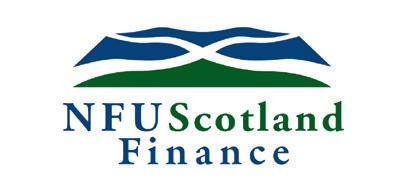
Spread the cost and manage cashflow.
Help manage seasonal payment cycles.
Access the la test machine ry and equipment.
Access captial tied up in machine ry with e -financing options.



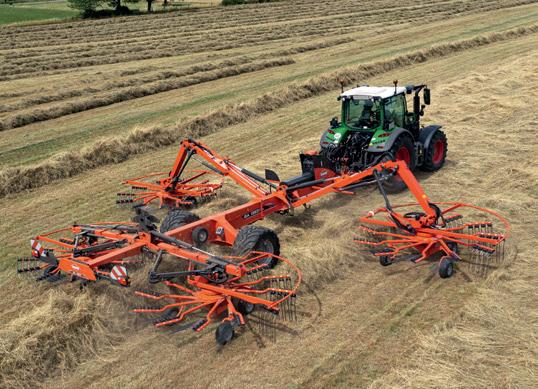






New section control possibilities – maximise working efficiency
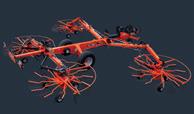





 Jonnie Hall Director of Policy
Jonnie Hall Director of Policy
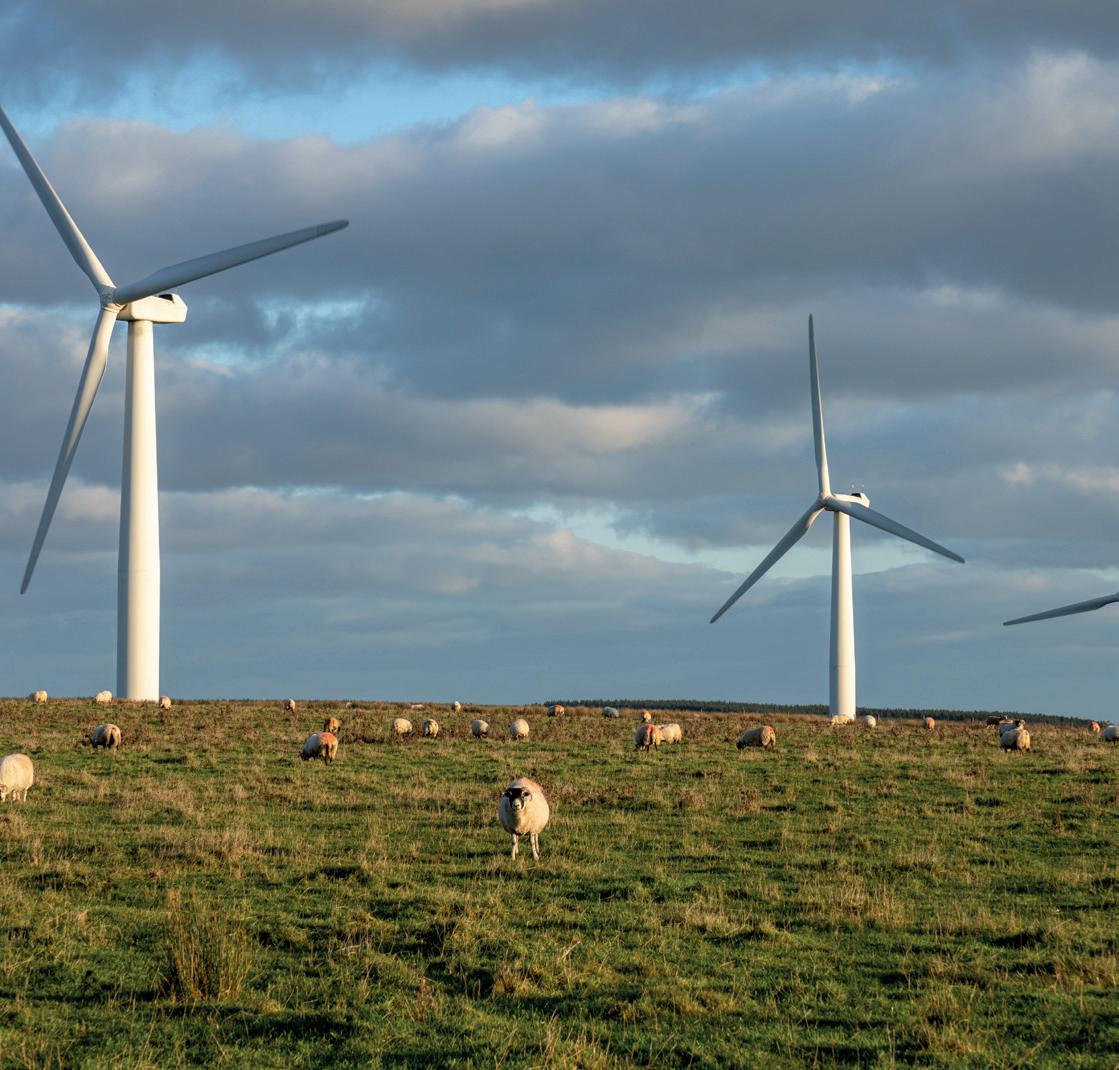
t’s as good as certain there will be a General Election this year to create the next UK Government. While most policy, legislation and regulation which directly and indirectly relates to our interests in the future prosperity of Scottish agriculture is devolved to the Holyrood and the Scottish Government, our attention and influence must also be fixed on Westminster.
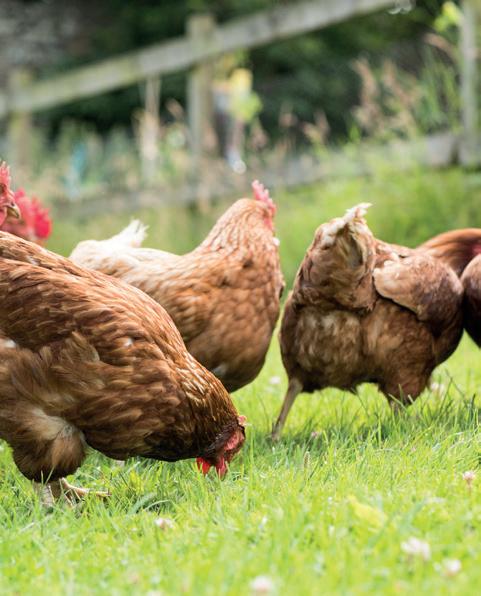
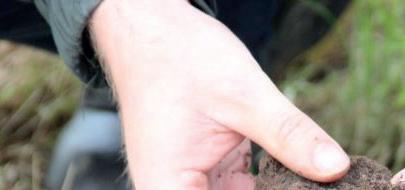
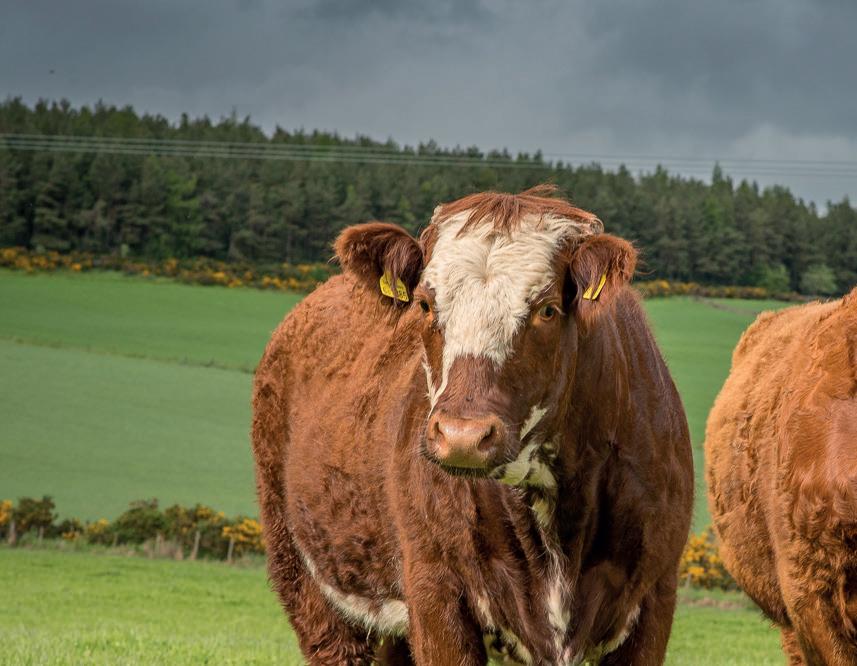

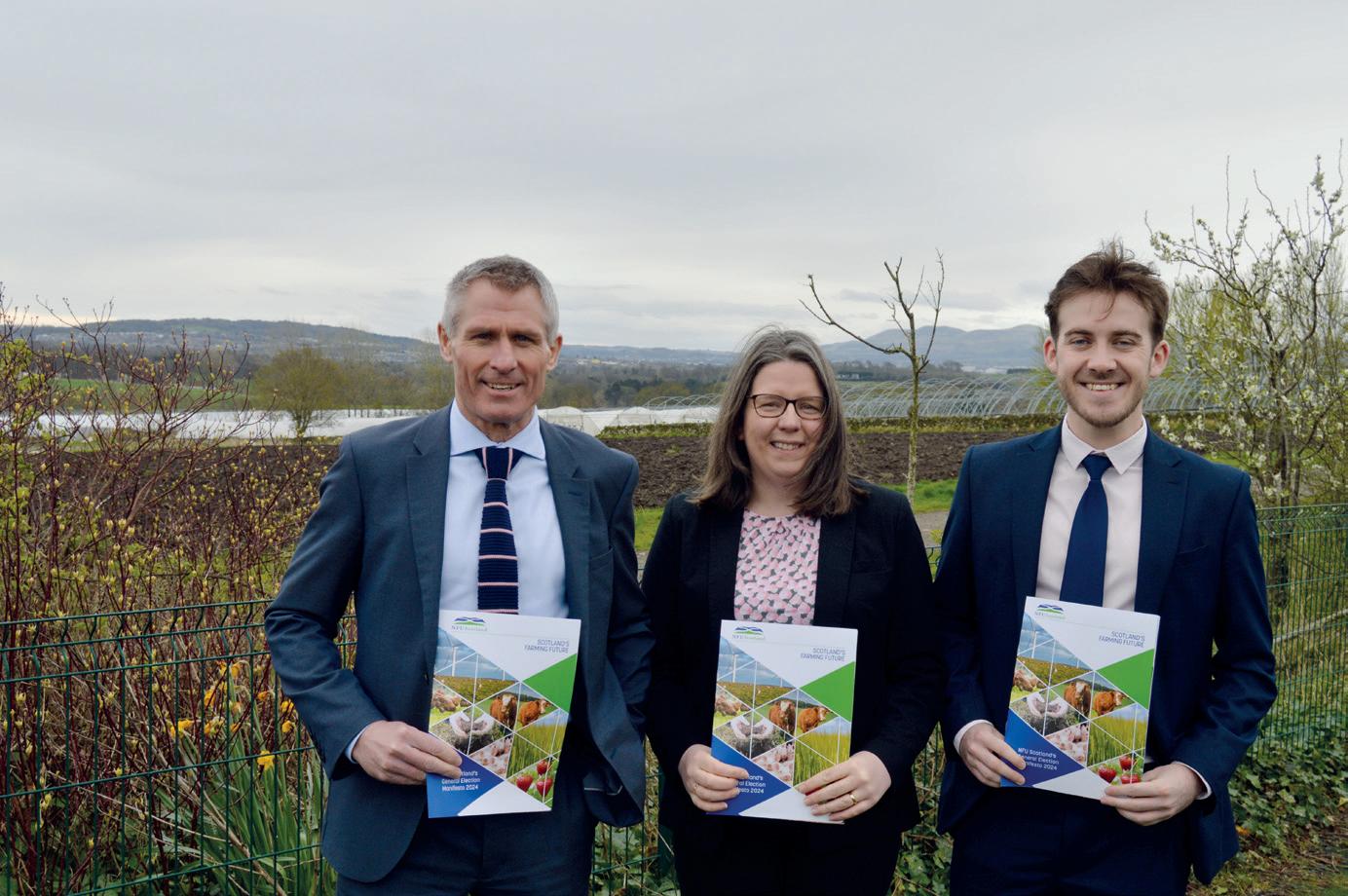
There are fundamental issues that are reserved to the UK Government, such as trade, migration, and internal market issues. Critically, we must also look to the next UK Government for certainty on sufficient future funding for the whole of UK agriculture if farmers and crofters in Scotland are to be effective in delivering what they are to be tasked with.
We’re a remarkable industry committed to highquality agricultural production, helping to tackle climate change and enhance nature. The next parliamentary term will be pivotal for Scotland’s farmers and crofters. We’re calling on the next UK Government to provide what’s needed to help ensure that necessary economic, environmental and social outcomes are delivered.
Launched on 10 April and put before MPs from across all the main parties at Westminster on 16 April, our NFU Scotland Manifesto 2024 sets out specific commitments that Scottish agriculture requires to meet its full potential. We need commitments from the next UK Government, and we need commitment from all Scottish MPs who should all be championing the interests of Scottish agriculture.
Top of the list is the fundamental need to deliver increased, ring-fenced and multi-annual funding.
Food security and agricultural production are significant political issues. Future support budgets will play a significant role in the viability and confidence of the Scottish agricultural sector. The funding provided by the next UK Government will be critical for Scottish agriculture’s impact to help meet UK-wide objectives relating to climate, nature and food production.
WE’RE ASKING THE NEXT UK GOVERNMENT TO:
• Commit to an increased, ring-fenced and multiannual agriculture and rural development budget for the UK from 2025-2029.
• Increase the current UK Government’s funding commitment by at least an additional £1 billion, to at least £4.7 billion, given the costs to deliver the required public interest and public good outcomes.
LtoR: Politics team, Jonnie Hall, Beatrice Morrice and Al Walker at the launch of NFU Scotland’s General Election Manifesto 2024.
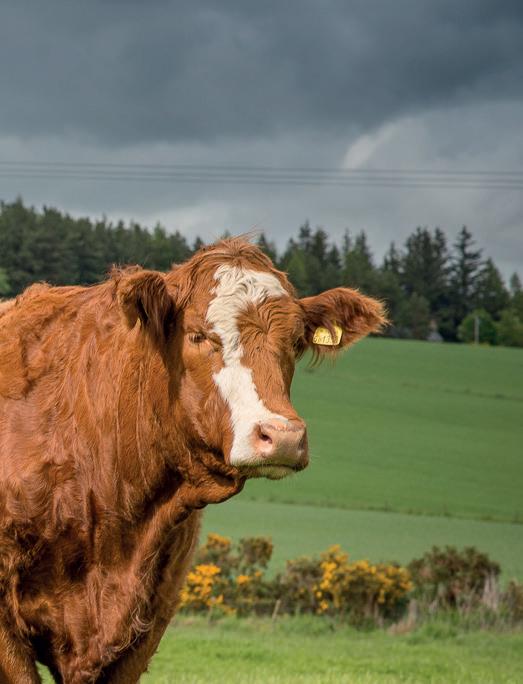
• Review the allocation of total funding across the UK to better reflect that Scotland punches above its weight in delivering for food, climate and biodiversity.
Increased and sustained producer returns across all agricultural sectors are critical too. Fairer supply chains, increased processing capacity, greater collaboration and better promotion would enhance the UK’s food security and would bolster domestic production of high-quality food. The UK’s high environmental and animal health and welfare production standards must be recognised and protected. Equally, there must be fairness throughout the supply chain.
WE’RE ASKING THE NEXT UK GOVERNMENT TO:
• Use the powers in the Agriculture Act 2020 to empower producers’ and growers’ negotiating positions.
continued on p26

continued from p26
• Review labelling regulations to provide greater transparency for consumers where more than 50 percent of ingredients are sourced from outside the UK.
• Extend the role of the Groceries Code Adjudicator and the Code of Practice to cover the full supply chain.
• Introduce a duty on retailers to produce an annual report on local sourcing.
The availability of sufficient skilled workers is essential for the agricultural and food processing sectors. Over recent years, the lack of certainty in accessing farm labour and the difficulty to recruit and employ workers, has resulted in crop loss, a drop in production and disruption of supply to the domestic and export markets. It is also vital that we have a proficient workforce throughout the supply chain, including sufficient veterinary and food processing capacity.
WE’RE ASKING THE NEXT UK GOVERNMENT TO:
• Introduce a minimum five-year rolling seasonal workers scheme with a suitable length visa and no cap on worker numbers.
• Commit to developing and delivering migration policy that works for the rural economy, food security and worker welfare.
It’s also vital that agricultural interests and access to our food and drink sector are no longer used as bargaining chips to secure market access for other sectors in future free trade deals. Equally, there must be effective safeguards to protect domestic food security, including effective border controls to minimise food fraud and biosecurity risks.
Food security must also be a priority of the next UK Government. Committing to sustainable domestic agricultural production rather than a reliance on importing food - while exporting emissions and standards - is essential.

WE’RE ASKING THE NEXT UK GOVERNMENT TO
• Class agriculture as a sensitive sector in the context of any new trade deals.
• Publish an annual Free Trade Agreements assessment to quantify the cumulative impacts of trade deals.
• Introduce a formal process to develop and establish core production standards for all agri-food imports.
• Increase resources for import controls to help protect food biosecurity.
• Commit support to grow agri-food exports and promote our high-quality produce around the world.
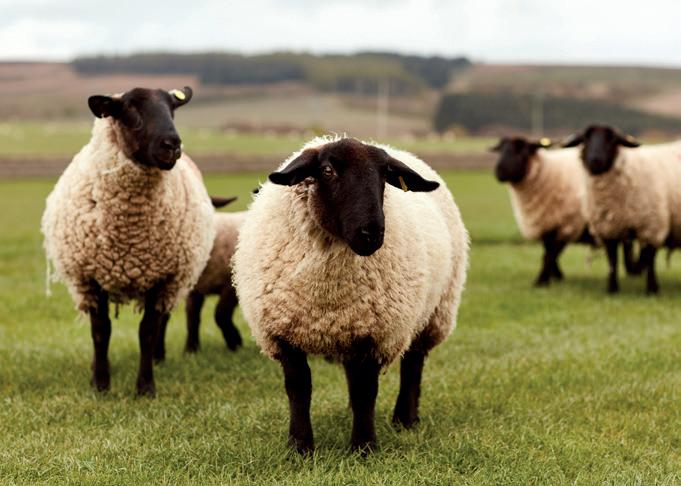
For many in Scotland who aspire to get on the farming ladder, or develop, diversify and grow their business, changes to reserved fiscal matters relating to land and capital are needed. It is critical that the next UK Government reviews a range of relevant taxation issues to enable establishment, investment, and growth opportunities for agricultural businesses across the UK.
• Increase the use of tax and fiscal incentives to encourage the longer term letting of land to agricultural businesses.
• Increase capital allowances to incentivise investment in working capital and equipment, as well as longerterm investment in buildings and structures.
• Introduce investment and fiscal measures to accelerate farming’s renewable energy potential,
Securing these commitments from the next UK Government would take us a long way towards our goal of a sustainable and profitable future for Scottish agriculture.
Farms are often vulnerable to leaks that can significantly increase water bills.
In the summer months when consumption is high, the telltale signs of a leak can go undetected for a significant period, racking up costs for unsuspecting farmers.
Many large water retailers fail to take over 20% of the meter readings for which they are responsible, and it's strongly suspected that they have a much higher failure rate with rural customers. Failure to obtain water meter readings increases the chances of a leak going undetected for longer.
With costs for businesses rising across all sectors, it’s essential that farmers can find low cost ways to spot leaks early and improve water efficiency to reduce water usage and costs.
Castle Water, the UK's largest independent water retailer, is defying industry norms by being the only retailer to have its own highly trained meter reading team. Unlike outsourced teams, they don't have to focus on reading a certain number of meters a day, meaning they can spend time getting essential
annual readings from some of the most difficult to access places. No other retailer has made that investment. Castle Water encourages its customers to submit monthly meter readings on their online account, to keep bills accurate and cheap, and to help spot irregular consumption - often indicating a leak - early.
A straightforward way to identify leaks is to monitor flow rates overnight when water usage should be minimal, and high nighttime consumption is often a sign of a leak. If you really want to get ahead of leaks, installing a water meter reading device is a great time saving and cost-effective solution.
Limpet readers are a budget friendly option for farmers looking to avoid costly leaks while minimising the hassle of monthly meter readings. The limpet reader attaches to your analogue water meter to provide accurate readings directly to your mobile device. Simply walk within radius of your meter to be sent your latest reading. Limpet readers are quick and easy to install and can be up and running in 15 minutes.
To find out more about leak detection and repair, limpet readers and to get free water efficiency resources, visit castlewater.co.uk/NFUS or call us on 01292 231020.
Water
Most of the UK, including parts of Scotland, face seasonal water shortages, and in some cases



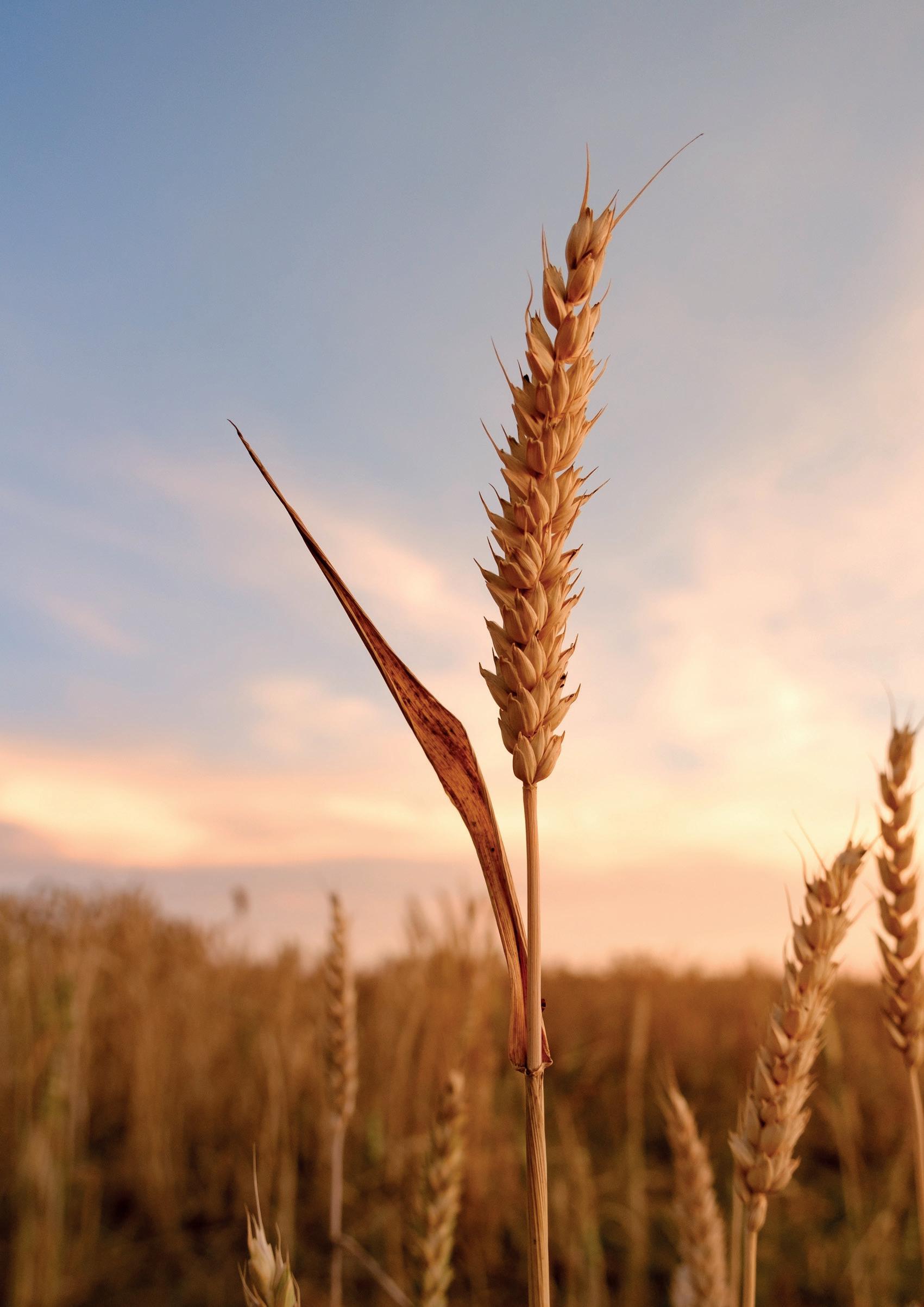


we are urging those who abstract water for their farming business to plan ahead and build resilience in case conditions





 Sarah Cowie Policy Manager
Sarah Cowie Policy Manager
As we move more into spring and the start of the ‘dry’ season, SEPA has published the first Water Situation Report of 2024. The report provides information on water stores in the ground, lochs and reservoirs. Weather conditions over autumn and winter have a huge role to play in how replenished these stores become. It won’t be a surprise that we experienced a very wet autumn and winter – even as I write this article, in early April, it is dreary, wet, and miserable. The only small positive in this is that it has allowed a good recovery of water resources – natural water storage, in lochs and groundwater, is normal to high for this time of year.
We know however how quickly and intensely things can change. Forecasting already shows that there is a slightly increased chance that spring
could be warmer than normal. We can’t rule out a repeat of water shortages that we have faced in the past two years – and we certainly can’t rule out disruption to businesses as a result. You may remember that in 2022, SEPA imposed suspensions on 175 water abstraction licences in four catchment areas because groundwater levels were so low. When water levels become low, it is a serious issue. Not
just for the environment, but also for food production. We cannot produce food without a consistent and plentiful water supply. That is why we are urging those who abstract water for their farming business to plan ahead and build resilience in case conditions change. Putting in the work and taking the right steps now will lower the likelihood of resources reaching a critical level again this summer.

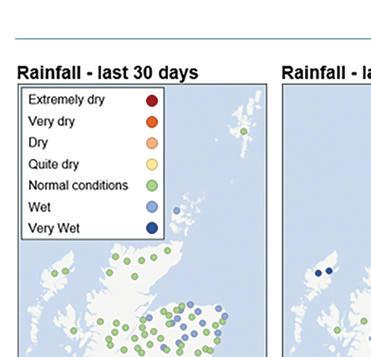
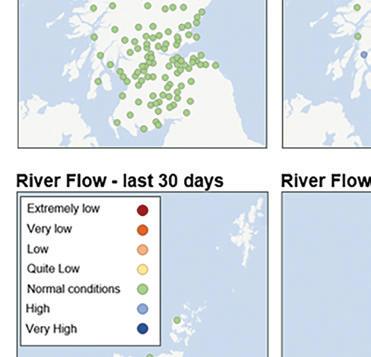
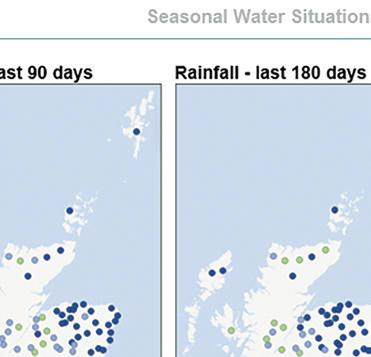

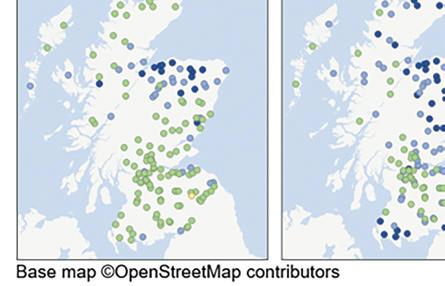
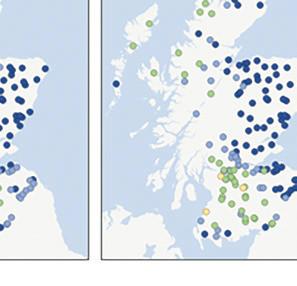

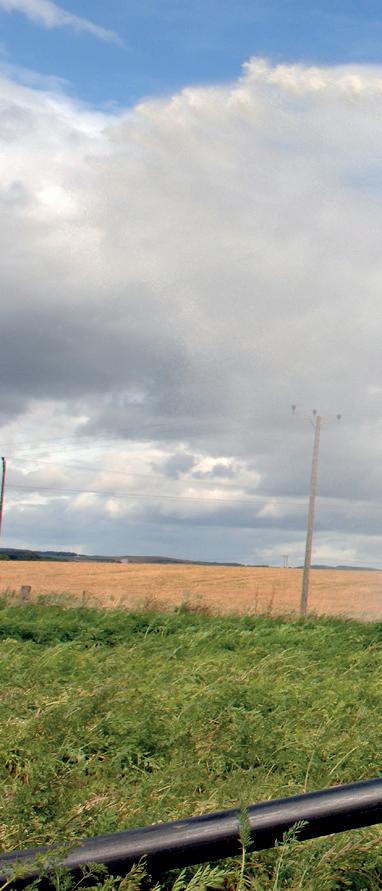
The fi rst thing to do is plan, monitor and record your business’s water use. Regular monitoring will enable you to quickly spot if something is not right and react – for example, a leaky pipe, which can lose a signifi cant amount of water and money if left unrepaired. This will also enable you to have a baseline and can be useful to assess the eff ectiveness of any effi ciency measures you put in place. Once you have done this you will be able to identify actions to reduce the water consumed, or reuse water. There are many options for water reduction and reuse, for example, having extra capacity to harvest rainwater during periods of heavy rainfall will reduce the pressure when water is in short supply.
For irrigators, you could consider forming an abstraction group with other irrigators in your local area to share best practice and knowledge, and stagger abstractions accordingly to reduce pressure on the water source. You should also optimise use of irrigation water by monitoring
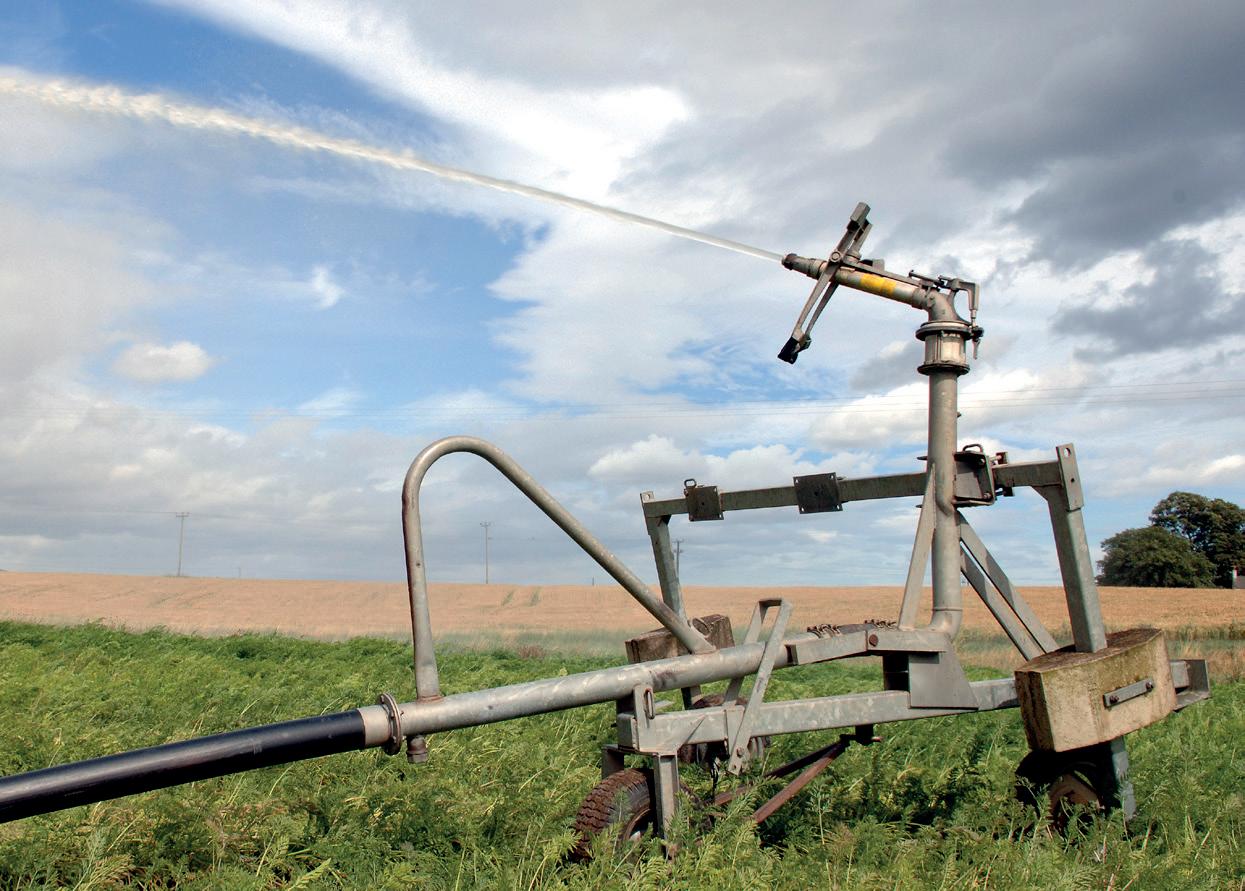
we successfully lobbied Scottish Government to include a standalone irrigation lagoon option in the 2024/35 AECS round
weather forecasts, soil moisture details and crop growth stage by using irrigation scheduling techniques. It’s however important to always follow conditions in your abstraction permit.
You are also able to access further advice and support on how to increase resilience on the SEPA website. From May, SEPA will publish its weekly Water Situation Report (see example on opposite page), which looks at the latest conditions including rainfall, forecast and river fl ows. The Drought Risk Assessment Tool is also a useful resource.
It provides information on each river monitoring station and the length of time it has been below Q95. This can be complicated, but Q95 essentially means the river is fl owing naturally for 95 days out of 100 days. If it goes below that, for 30 consecutive days, there is cause for concern and according to the National Water Scarcity Plan, SEPA must take action to protect the environment.
We continue to work with SEPA, Farming and Water Scotland and the Scottish Government to emphasise the importance of water effi ciency
measures to the farming community. For example, we successfully lobbied Scottish Government to include a standalone irrigation lagoon option in the 2024/35 AECS round. This was a huge win for our lobbying eff orts, and we hope this will be continued in future years. As well as this, at the time this issue goes to print, our President Martin Kennedy will have attended a Roundtable on Water Resources with Jim Fairlie MSP, Minister for Agriculture & Connectivity. This was a Programme for Government commitment to tackle the serious issue of future water resource planning.
Overall, we will continue to underline the key importance of agricultural production in Scotland, and the need to have a consistent quantity and quality of water. But this will require a whole-team effort – from Government, from SEPA, from us and from you, our members. We all need to work together to ensure we continue to manage and access water resources sustainably.
HIGHLAND




REGIONAL MANAGER
Ian Wilson
07775 915 988
ian.wilson @nfus.org.uk
As always anything that you think NFU Scotland can be of assistance to you please get in touch.
he new SRUC Rural and Veterinary Investigation Centre (RAVIC) at the University of the Highlands (UHI) campus in Inverness was offi cially opened on 26 March by HRH Princess Anne. The £12.5 million centre will provide a great resource that will hopefully help bridge the gap between science and industry, drive innovation and create new technologies for Scotland’s land-based sectors. It’s a superb facility which includes a centre for epidemiology and planetary health and is part of Scotland’s new School of Veterinary Medicine, focusing on animal disease, climate change and food security. There’s high anticipation the new centre, will play an important role in developing the future of livestock farming both within the Highlands and far wider, reinforcing SRUC’s position as a leader in sustainable solutions for animal health, agriculture and human health.


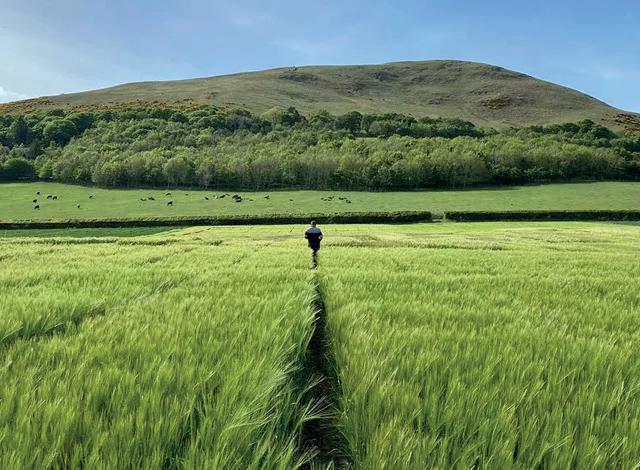
Our Regional tour with an overnight in the Edinburgh area is starting to take shape with the dates confi rmed as Tuesday 21 and Wednesday 22 May. We have already have some great visits set up including a visit to an arable and livestock farm that’s part of the Agri-Epi satellite farm. There participants will be able to view new technologies being used in practice. We’ll also be visiting SAC Consulting’s Easter
Howgate Farm where amongst other things a lot of research is being done into methane emissions from cattle and sheep. These along with two other mixed livestock and arable farm visits promise to be both an enjoyable and interesting trip. Any member keen to come along please let me know asap ian.wilson@nfus.org.uk or 07775915988 as places will be limited, there will be a charge for going on the trip when all costs are known.

AYRSHIRE




REGIONAL MANAGER
Mhairi Dawson
07718 425 053 mhairi.dawson @nfus.org.uk




REGIONAL MANAGER
Sheena Foster
07789 796 582
sheena.foster
@nfus.org.uk
Iam farming in partnership with my wife Allison and son David, farming 420 acres low-ground and 1350 acres hill land. This comprises a mix of owned land, an MLDT tenancy and seasonal lets.
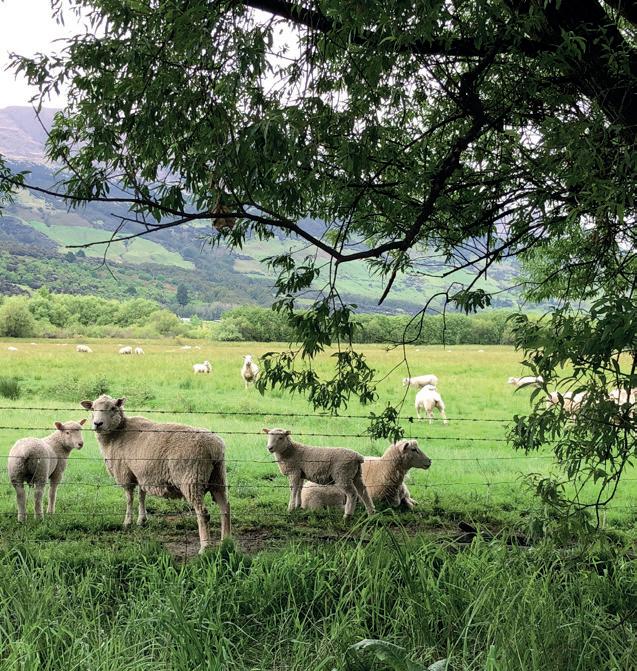
Sally and Wallace Kennedy run a small family farm near Maybole with both third and fourth generation working in partnership. Both Sally and Wallace are working full time off farm – in construction and aerospace – and see this as a great positive as they can bring in skills and ideas from different sectors to enhance their agricultural business. They are continually looking at new ways to simplify existing systems and ways of making the farm work within the existing labour and time restrictions.
The enterprise mix is 400 breeding ewes and up to 200 store lambs. Ewes pure Beltex, Mules, Kerryhill x mules and the terminal sire is principally the Beltex. Pedigree Beltex sold at breed sales. The cattle enterprise consists of 35 pedigree homozygous polled and homozygous black Limousin cows plus followers. Heifers retained on basis of docility, ease of calving and milkiness. Homebred calves plus around 50 bought in store cattle are fi nished at home and bulls reared for farm-
to-farm sale around two years. Trying to maximise home grown production as much as possible, the farm grows grass, barley, and fodder beet for their own use.
Diversifi ed income comes to the enterprise via holiday accommodation. There is currently one cottage and a shepherd’s hut for let with another cottage in the pipeline for late summer 2024.
As a former lecturer in further education, Sally has retained a special interest in agricultural education and promoting this is one of her personal priorities as Ayrshire Regional Vice-Chair. Another is to harness the ideas and infl uences from people who are thinking diff erently and adapting ideas from other industries. The most dangerous phrase is ‘but we’ve always done it this way’. Sally believes there is a place for everyone and all their broad range of ideas which can grow agricultural business and our local rural communities. She looks forward to working with Ayrshire members, stakeholders and interested parties as part of her role.
We carry 150 suckler cows, both spring and backend calving and with additional purchased stores, fi nish 350 cattle annually. The sheep fl ock comprises 1000 ewes with all lambs fi nished on-farm and replacements homebred. We have a pedigree Charollais fl ock producing tups for our commercial fl ock and for sale. We show at the Royal Highland Show as well as supporting local shows which we believe are a great shop window for our industry.
I used to run a contract shearing business with my brother which David is now continuing. We recently became South Ayrshire monitor farmers and are really enjoying both the social and business aspects of getting like-minded local farmers involved in discussing and assessing diff erent options for Ayrshire farming.
At present I’m a Regional Vice-Chair and the Livestock Committee representative. As a family, we’re passionate about farming and the need to get the next generation into the industry. With the right political will and the Union fi ghting our corner, I really believe that the next few years are going to be good for Scottish Agriculture with food security becoming ever more important.




REGIONAL MANAGER
Mhairi Dawson 07718 425 053 mhairi.dawson @nfus.org.uk
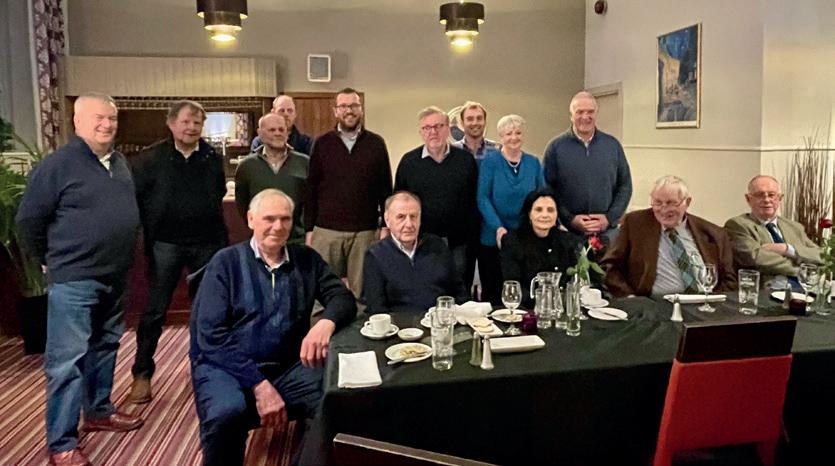
We finished our Southwest series of RPID ‘What to Expect at Inspections’ meetings in Wigtownshire with the team from Ayr RPID office in mid-March. Feedback has been very positive with members feeling more confident, reassured, and comfortable with both inspections and inspectors. Thanks to everyone who attended, the RPID teams from Dumfries, Ayr and Hamilton and to local case officer Mary Anne MacWilliam from RSABI for her contributions. You should have received a follow up email with a list of resources but if not, please get in touch. The RPID teams are keen to work further with NFU Scotland members. If you have an issue you feel they could support you with, get in touch and we can arrange a meeting.


Akey priority for the region, Stewart Wyllie wrote to all local and South of Scotland MSPs and MPs to introduce himself as the new Regional Chair for D&G. Since then, Stewart has met with David Mundell MP and Oliver Mundell MSP at a Langholm branch meeting, hosted Emma Harper MSP, Finlay Carson MSP and John Cooper Conservative candidate for D&G on-farm and also met with Sharon Dowey MSP online. Our main topics of conversation were our members
concerns over national park proposals and the implementation of the Ag Bill and future support. NFU Scotland nationally and regionally will continue to lobby politicians on your behalf however it’s very important that you, as an individual, do the same. Please contact them to highlight the key issues facing you, your business, and families. Your local councillors can be found online at moderngov.co.uk and your local MSPs can be found on the Scottish Parliament website.
I’ve had a few calls recently from members who haven’t been receiving communications from the Union for various reasons. Please check if your details with us are correct. If we don’t have an up-todate email address and mobile number for you, you could be missing out on local event reminders and information.

 REGIONAL POLICY ADVISOR
REGIONAL POLICY ADVISOR
John Laughton
01856 872 048
john_laughton @nfus.org.uk ORKNEY
As I sit and pen this in mid-April and at the tail end of lambing, the weather is at the forefront of everyone’s thoughts. Another spell of rain has saturated the ground again and the lambs that have been turned-out are looking pretty miserable. If I had started writing this a week ago I would have told a different story with the ground drying-up and thoughts turning to getting sand and fertiliser spread. It is fair to say that Orkney has faired a lot better than the rest of Scotland but it has been a very hard winter so a bit of dry weather would be welcome. No panic stations yet
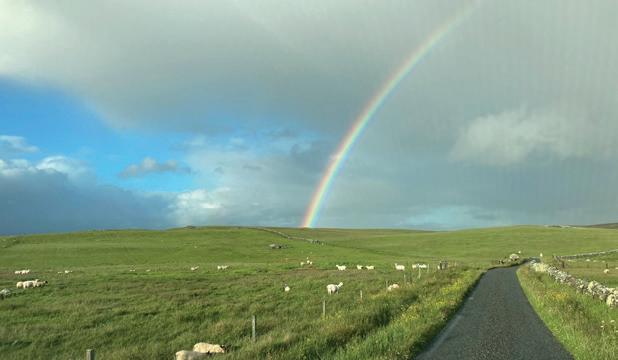
but things need to improve. By the time this article is published we may well have had a good spell of spring-like weather but at the moment even a day without any rain is greatly needed. Orkney has a short enough growing and
grazing season so hopefully the summer will make up for a dismal winter and spring. We are a resilient bunch but keep thinking about those that are struggling and extend an encouraging word or offer of help.






REGIONAL MANAGER
Sheena Foster
07789 796 582
sheena.foster @nfus.org.uk



Vice-President, Alasdair Macnab joined the Balquidder and Killin Branch meeting from his home in Dingwall via Zoom. Held in the Killin Hotel, most members attended the meeting in-person with some opting to attend via technology thanks to the new meeting OWL device provided to the Region. Alasdair highlighted the various workstreams that the Union is currently working on which led to further discussion and questions from those in attendance.




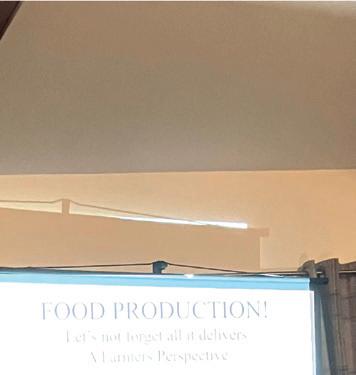
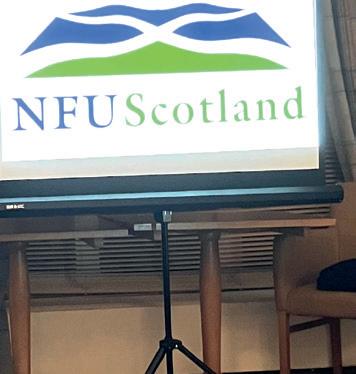
The Balfron and Menteith Branch held their fi rst meeting of 2024 with a visit from NFU Scotland President, Martin Kennedy. Martin gave an insightful presentation on the set up and evolution of his own farming practices before sharing and answering questions from the members on Union activity.
Branch Chair, Duncan McEwan had Martin reminiscing and sharing some funny stories when asked “What his biggest highlight has been so far?”
The members thoroughly enjoyed the meeting and the President’s continued positivity.

Representatives from the Ayr and Hamilton Rural Payments and Inspections Department (RPID) joined Forth & Clyde and Ayrshire members at the Parklands Hotel, Newton Mearns for a ‘What to expect from Inspections’ meeting. The meeting gave members and local RPID Offi cers the opportunity to engage with the focus being on sheep, cattle and land inspections. Due to the positive feedback received, we hope to be off ering more of these engagement opportunities later in the year.

We are now in the midst of show season, if you are attending your local show and there is an NFU Scotland stand there – make sure you pop in and say hello. You’ll always get a smiling face and a friendly welcome.



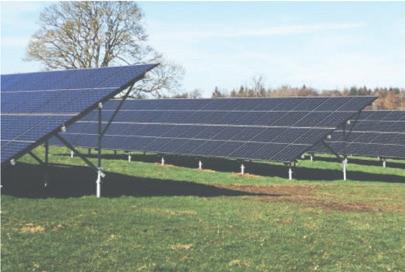
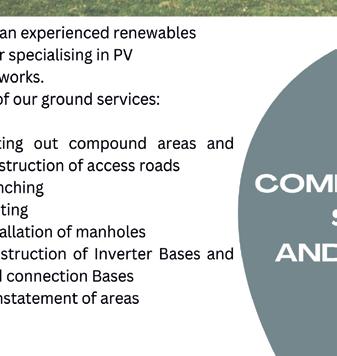



Caledonia Play uses its knowledge of the timber industry to create unique and robust play equipment.
Perfect for farm shops, caravan parks and camp sites, self catering cottages, and other family destinations.
Contact us today 01577 840570
www.caledoniaplay.com




Lee Smith
07554 741 030 lee.smith@nfus.org.uk
Shetland Island Council are in encouraging farmers and crofters to investigate abortions and stillborn in flocks. Lucia Malcolmson, Shetland Animal Health Scheme Research Officer - Environmental Health, put together a poster encouraging farmers and crofters to get in touch with your local vet in the event of an abortion or stillborn lamb.




Kate Maitland
07919 001 23 kate.maitland@ nfus.org.uk
Enzootic Abortion of Ewes (EAE) is primarily caused by the bacterium Chlamydia abortus. When an infected ewe aborts, a substantial amount of the bacteria is shed in the placenta and uterine discharge for up to 10 days. Once the infection is established it is difficult to eliminate.
The spread of this infection occurs over lambing and tupping time however ewes can also become infected by coming into contact with contaminated placenta and uterine discharge, aborted lambs, contaminated clothing from the crofter or abortion fluid carried by wildlife.
Affected ewes show no indication of carrying the infection and once infected the bacteria damages the placenta, with EAE abortion occurring as early as two to three weeks before lambing. Prevention includes biosecurity and biocontainment. Implementing robust biosecurity measures is crucial. Maintain a closed, clean flock to prevent the introduction of new diseases. Another option to consider is vaccinating against EAE. If you have any concerns, please contact your local vet.
Willie Rennie MSP has hosted several meetings since the New Year in North East Fife seeking solutions to reduce flooding in future years, something NFU Scotland has been actively been supporting. North East Fife was badly hit by the late December storm with next to no financial support for those whose property was badly damage. A strong message was delivered by many that the rivers need managed and unnecessary debris needs removed. Initial discussions have started with SEPA to see what can be achieved and we hope to meet with them soon.

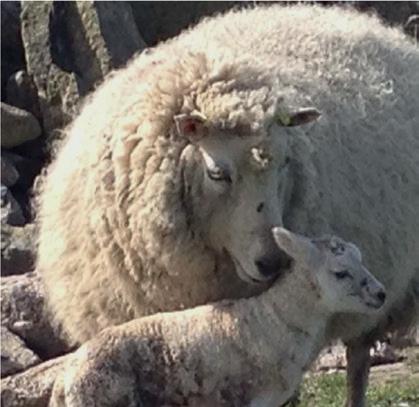
To have a healthy lambing �nve��gate abo��on� an� ��llbi�th� in yo�� �o��



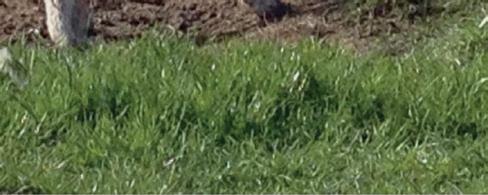
�oÊinves��ateÊabor�onsÊinÊ�ourÊ�oc�ÊcontactÊ�ourÊveterinar�Êsur�eonÊÊÊ WhereverÊpossibleÊpleaseÊrememberÊtoÊincludeÊplacentaÊinÊtheÊ samplesÊ�ouÊ�iveÊtoÊtheÊvet�ÊÊ�hisÊ�ivesÊtheÊbestÊchanceÊo�Êiden���in�Ê theÊcauseÊo�Êabor�on�

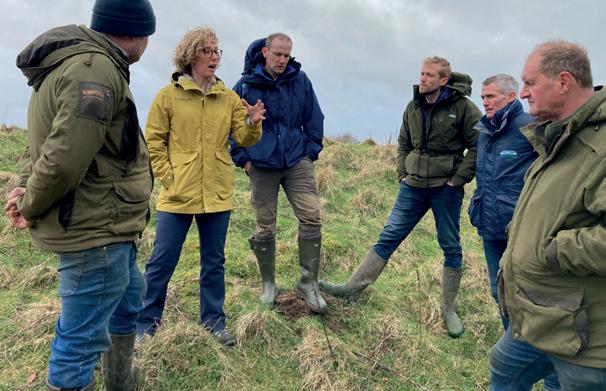
Lorna Slater MSP, Minister for Green Skills, Circular Economy and Biodiversity, recently met with members and staff on-farm in Perthshire to see and hear fi rst-hand how the impacts of beavers and river management restrictions have signifi cantly compounded agricultural losses and fl ood bank damage. Ms Slater saw the site of a broken fl ood bank that had been compromised by a nearby beaver
lodge causing eye-watering physical and fi nancial losses that the farm business cannot sustain.
At the very least, we are seeking full exclusion of beavers from Prime Agricultural Land (PAL) and productive land contiguous to it, a simplifi ed licencing scheme for beaver control, and comprehensive review of the Controlled Activities Regulations (CARs) to allow river management to reduce fl ooding risks.




We are continuing our work to resolve the ongoing issues linked to ferry and livestock transport problems associated with the aging Calmac fleet. This is very much a team effort with Group Secretaries, Regional Managers and Head Office staff doing what they can to help alleviate the problems with the ongoing undercapacity and cancelations, breakdowns, and booking issues associated being experienced.
Unfortunately, fully resolving this problem is not a quick fi x as ScotGov have not grasped the reality that ferries are machines that have a working design life of about 25 years. They’d need to catch up by purchasing three or four large ferries a year not just one or two for quite a number of years. We will continue to push hard in our members’ interests.
There was an MSP liaison meeting on-farm in April, which was kindly hosted by Alastair Dixon, Killinochonoch Farm, Kilmartin. Alastair runs a mixed suckler and sheep farm typical of the area. It was a great meeting where lots of topical issues were discussed.
We have a Livestock/LFA/ Dairy meeting planned for 16 May which will be held at Glenbarr Farms, kindly hosted by the
Macalister family. This will be an informal meeting with Tracey Roan, Dairy Policy Manager and Lisa Hislop Livestock and LFA Policy Assistant providing updates on the various workstreams they are involved with. This will be followed by a question-and-answer session with members and a farm walk to show some of the changes the Macalisters have made since their time as the Kintyre monitor farm.
The Union, has been holding further meetings with the Rest and Be Thankful Business Pressure Group as the consultation draws to a close.
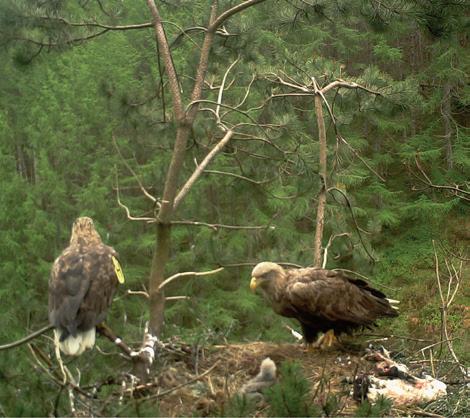
Springtime is lambing time and also the worst time of year for White-tailed Eagle Predation. We anticipate there will additional sightings and potential incidents in areas that have not previously experienced predation before. David Coulthard predicted that the species would spread up and down the west coast as well as inland quite a number of years ago. Please keep an eye out for unwanted visitors in the sky. It’s been a species reintroduction that’s had a major financial and mental impact on hill farmers in the region.
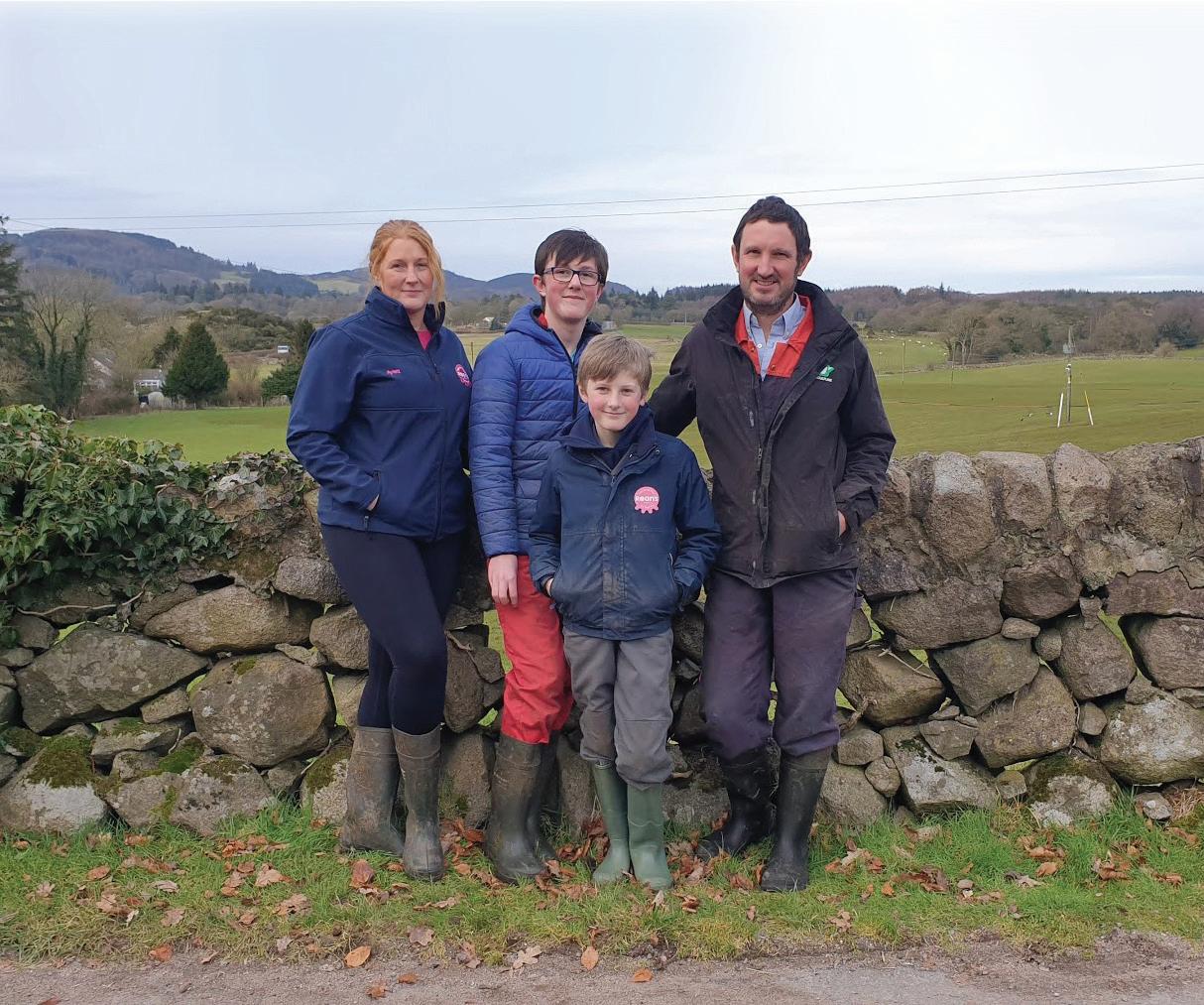






REGIONAL MANAGER
Lorna Paterson
07786 860 453
lorna.paterson @nfus.org.uk
Amassive thank you to Davie and Marie Smith from Inkhorn Farm, Auchnagatt.
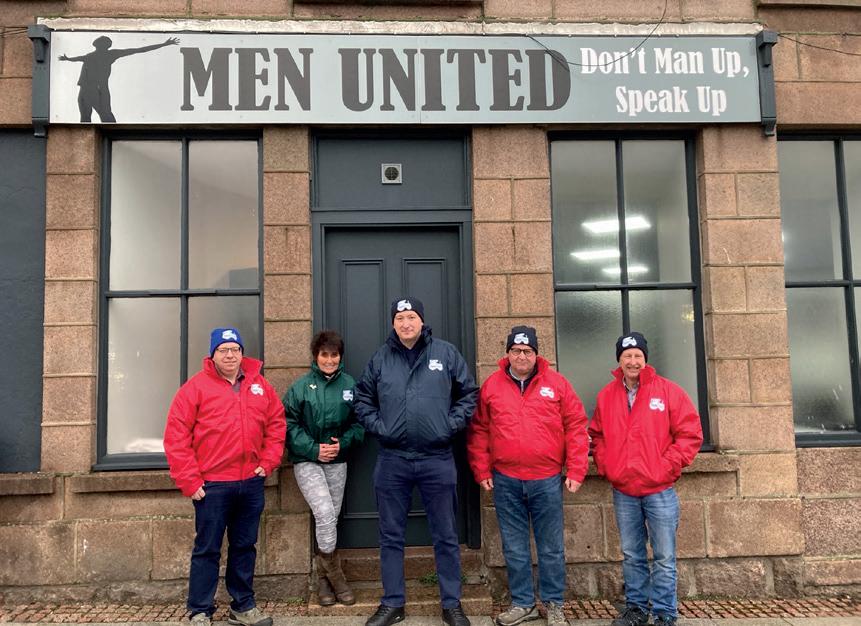
Davie turned 60 years young at end of March and hosted his birthday party in the local hall. Instead of receiving birthday presents, Davie suggested anyone who wanted to gift him something, instead made a donation to FarmTalk. As a result, a total of £1300 was raised. Thank you Davie and Marie – you’re fabulous folk!
On the subject of FarmTalk, we are formulating a mental wellbeing training program for volunteer members. You’ll receive free professional training to help understand the causes and symptoms associated with poor mental

The Royal Northern Agricultural Society’s 2024 Spring Show at Thainstone was well attended and, despite the weather being raw and cold, was a smashing success. Thank you to all who help man our stand throughout the day. We all enjoyed great banter with other stakeholders and members, as well as learning about new products and services from the variety
of other stand holders. We were very honoured to have Aberdeenshire’s Provost, Judy Whyte visit us too. Police Scotland’s stand was extremely busy, which in some way illustrates the magnitude of the increasing problems caused by rural criminality. If you wish to join our thriving North East Rural Crime WhatsApp group, please send your name and address to me (Lorna) on 07786 860453.
health and learn how best to signpost to relevant experts. FarmTalk is all about peer-to-peer support and is available to all adults up here who are involved in our agricultural industry. Please do help yourself, your family and potentially others by becoming involved. This is a sound investment for everyone.
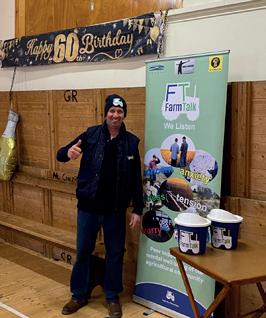
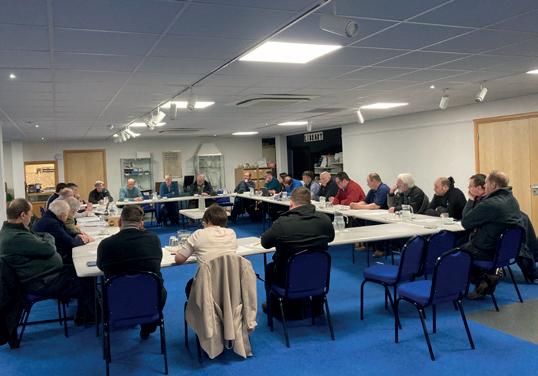
As mentioned previously, Ali Johnston Chief of RNCI (Royal Northern Countryside Initiative), Tyne (my dog) and I are participating in Aberdeen’s Mighty Stride Kiltwalk event on Sunday 2 June. If anyone would like to donate a few pounds to support this amazing organisation, please visit https://shorturl.at/fswNP We’re hugely grateful to our local NFUM Group Secretaries who are our key sponsors, and also to those members who have already generously donated at recent gatherings including NFU Scotland Regional Board meetings.



 Lindsay Brown
Lindsay Brown
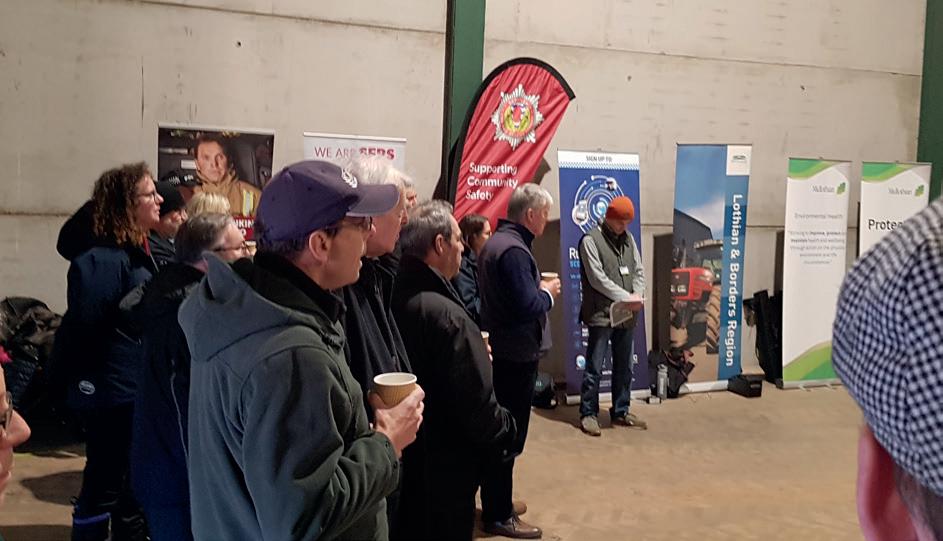
You may or may not be aware that an application has been submitted to Scottish Government for a National Park in the Borders. To date we have had no engagement on this –watch this space. Lorna Slater, Minister for Green Skills, Circular Economy and Biodiversity has committed to meet to discuss this application.
In February, MPARC held a Walk & Talk event at Rosemains, Preston Hall Farm, Pathhead by kind permission of the Callander family and Bill Gray farm manager. There were representatives from the local police and fi re services, SPARC Neighbourhood Watch and Midlothian Environmental Health Department. Attendees were shown around the yard and had the
actions already taken to deter thefts highlighted. Additional improvement suggestions were fl agged, explained and discussed. The group then heard from all the diff erent partners on what their latest messages and advice is with members also having the opportunity for members to ask questions on local issues. As a bonus attendees all enjoyed a tremendous bacon roll.
Robert Neill at Upper Nisbet kindly hosted a group of American students who had travelled to Edinburgh to attend a conference. He was able to show them the Ultra High Frequency EID cattle handling system and take them for a walk round the steading giving insight into his farm management system.
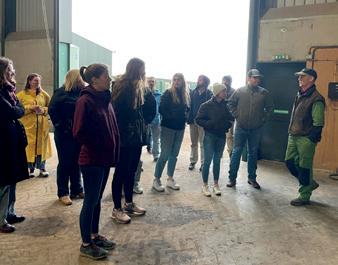

your local Machinery Ring about opportunities purchasing Case IH tractors, combines and balers.
your local Machinery Ring about opportunities purchasing Case IH tractors, combines and balers.

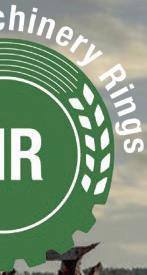
Speak to your local Machinery Ring about opportunities when purchasing Case IH tractors, combines and balers.
Speak to your local Machinery Ring about opportunities when purchasing Case IH tractors, combines and balers.
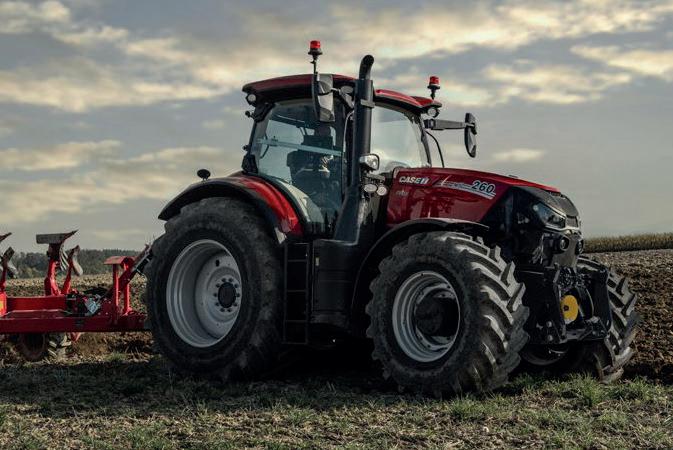





This May marks the 25th anniversary of the Scottish Parliament. In that time there have been six First Ministers and four Ministers responsible for the rural affairs/ agriculture brief. This year we saw a Minister for Farming appointed too coinciding with the first day of our National Conference in Glasgow.
During the first quarter of a century of the Scottish Parliament, NFU Scotland has engaged on a regular basis with Ministers, officials, and committees on a variety of key issues. In the first few weeks of the Parliament, NFU Scotland had submitted its first petition registered as No24. We really haven’t taken our foot off the gas since to ensure farming and crofting key issues have been understood and discussed by members of parliament in chamber, at committees and on farms.
Thanks to Scottish Parliament for supply of early images




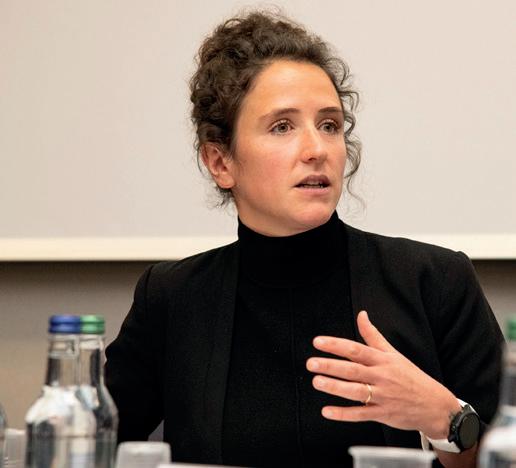








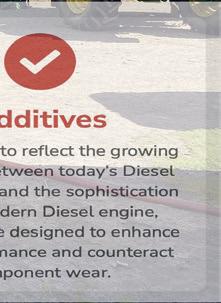
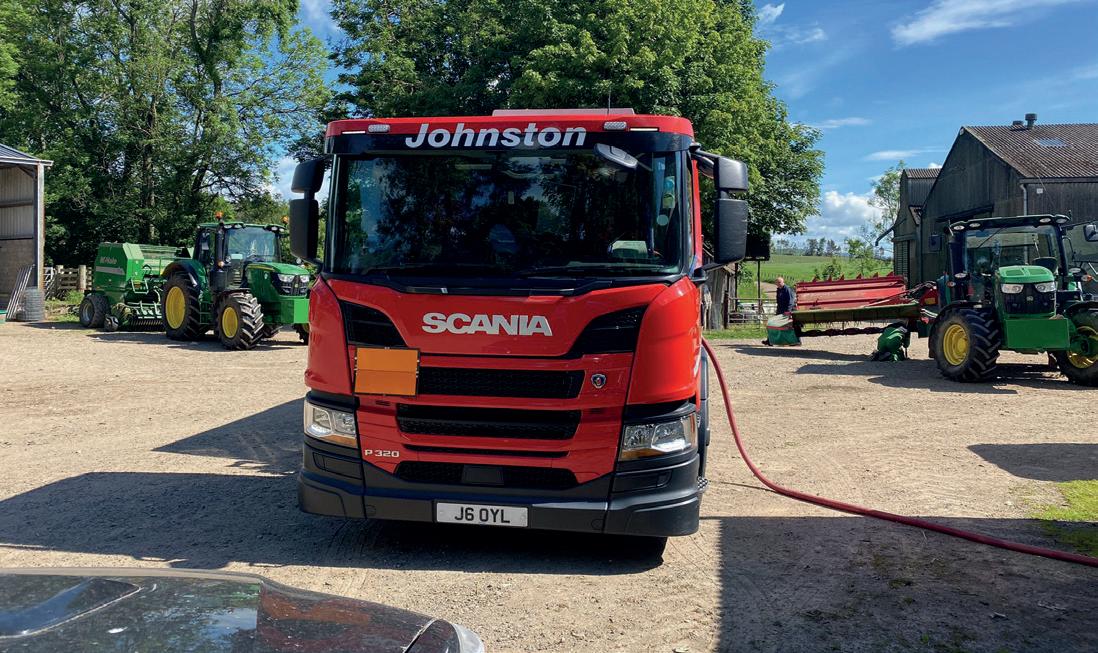


6 Donald Dewar
McLeish
Mentions in Parliament
First mention of NFU Scotland in motions was Duncan Hamilton MSP discussing LFAS and how 80% of farmers will be worse off if there were further negative financial cuts. (https://www.parliament. scot/chamber-and-committees/votes-and-motions/ S1M-01562)
The first mention of farming - Alex Salmond asking the parliament to recognise the drastic state that the Agricultural sector is in currently. (https://www.parliament.scot/chamber-andcommittees/votes-and-motions/S1M-00242)
56 votes have been passed in Scottish Parliament that included the word Agriculture. Topics including reform, CAP, Support, and much more.
Rural Affairs Committee – this committee has had six different names since 1999. We believe that at the first meeting on 31 August 1999 - one of the first actions was ‘a priority for us is to discuss the proposed visit to Ingliston to meet the NFU.’

Over the past 25 years, NFU Scotland has worked on behalf of its members on 47 Parliamentary Bills (42 passed and five current) and 26 Budget Bills. This equates to just over 17 percent of all legislation.
List of the Bills:
Agricultural Holdings (Scotland) 2002
Agriculture (Retained EU Law and Data) (Scotland) 2020
Air weapons and Licensing (Scotland) 2015
Animal Health and Welfare (Scotland) 2005
Animals and Wildlife (Penalties, Protections and Powers) (Scotland) 2020
Climate Change (Emissions Reduction Targets) (Scotland) 2019
Climate Change (Scotland) 2009
Community Empowerment (Scotland) 2014
Control of Dogs (Scotland) 2010
Dogs Protection of Livestock (Amendment) (Scotland) 2020
Crofting (Amendment) (Scotland) 2013
Crofting Reform (Scotland) 2010
Environment Assessment (Scotland) 2005
Flood Risk Management (Scotland) 2008
Food (Scotland) 2014
Forestry and Land Management (Scotland) 2018
Good Food Nation (Scotland) 2022
Hunting with Dogs (Scotland) 2023 Islands (Scotland) 2018
Land Reform (Scotland) 2016
Land Reform (Scotland) 2003
Land Registration (Scotland) 2012
Land and Buildings Transaction Tax (Amendment) (Scotland) 2016
National Parks (Scotland) 2000
Nature Conservation (Scotland) 2004
Planning (Scotland) 2019
Planning etc. (Scotland) 2005
Private Housing (Tenancies) (Scotland) 2016
Private Rented Housing (Scotland) 2010
Procurement Reform (Scotland) 2013 Protection of Wild Mammals (Scotland) 2000
Regulatory Reform (Scotland) 2013 Reservoirs (Scotland) 2010
Scottish Crown Estate 2018 Succession (Scotland) 2015 Trusts and Succession (Scotland) 2024
UK Withdrawal from the European Union (Continuity) (Scotland) 2020
Water Environment and Water Services (Scotland) 2022
Water Resources (Scotland) 2012
Wildlife and Natural Environment (Scotland) 2010
Wildlife Management and Muirburn (Scotland) 2023
Current Agriculture and Rural Communities (Scotland)
Circular Economy (Scotland) Housing (Scotland)
Land Reform (Scotland) Welfare of Dogs (Scotland)

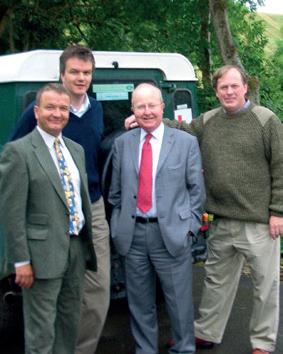
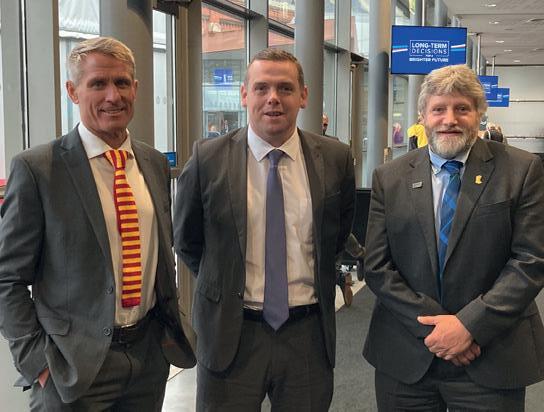
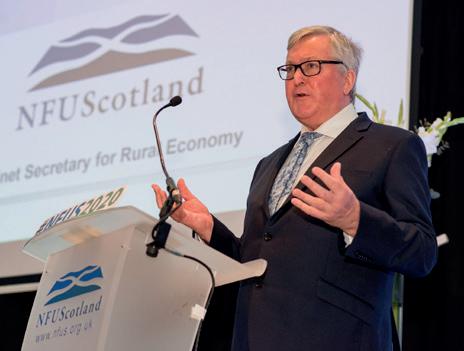
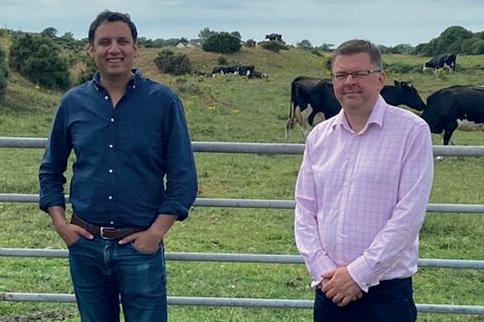
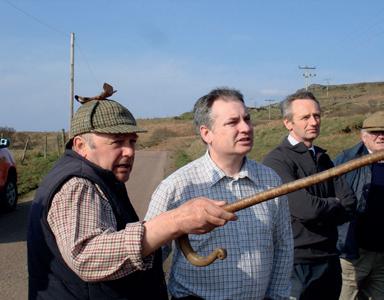
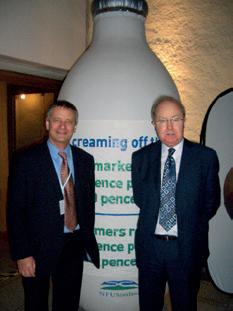
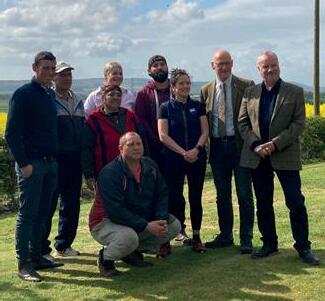


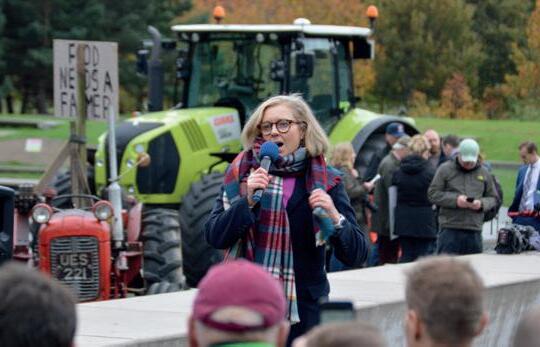


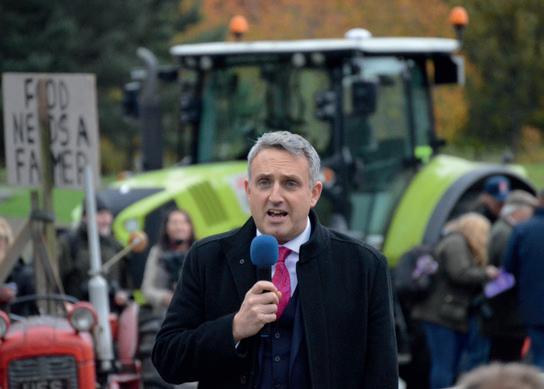



We spoke to the very first Minister and the current Cabinet Secretary who shared their views on the role and working with NFU Scotland:

2021-present: Cabinet Secretary for Rural Affairs, Land Reform and Islands Mairi Gougeon MSP said: “Since devolution, NFU Scotland have consistently championed the rights of farmers across Scotland. “I became Rural Affairs Secretary at a time when Scottish farming had reached a pivotal moment. Outside factors such as Brexit have continued to challenge the industry and our work to construct a future support framework that delivers high quality food production, climate mitigation, and nature restoration continues. In my time as Cabinet Secretary, I have worked closely with Martin Kennedy and other NFUS members to ensure that farmers’ voices are being heard as this new support system is developed.
“Although I have thoroughly enjoyed my time working with NFUS, a highlight for me is our work together as part of ARIOB. It is an excellent example of collaborative working and has allowed me to truly hear the voices and opinions of those within the farming community.”
Only four people have held the position of Minister for Rural Affairs since 1999.
Rossie Finnie
May 99-May 07
Richard Lochhead
May 07-May 16
Fergus Ewing
May 16-May 21
Mairi Gougeon
May 21-present
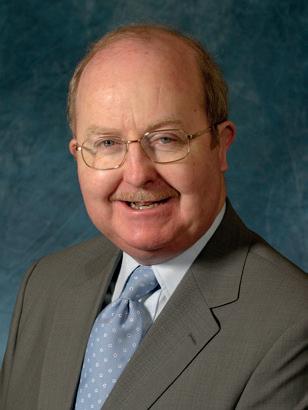

1999-2007: Minister for the Environment and Rural Development
Ross Finnie said:
“I wanted to create a constructive relationship with the industry. It was important for me to get to know better how the industry worked, to work with NFU Scotland and meet their members on the ground. In the early stages of devolution, we worked together with industry to develop a strategy.

“For me, the biggest success was the development of a constructive relationship, and it showed its strength as we faced the awful crisis of Foot and Mouth. I wasn’t long in office when Foot and Mouth disease struck. It impacted the whole industry and required a lot of determination, skill and patience to get through. If our strong relationship had not existed, it would have been more difficult.
“I tried to ensure Government worked with industry as it is such an important and critical sector - not just how we produce food on farm but also getting that food from farm to plate. I enjoyed my eight years as Minister. It was not an easy job, but it was an interesting and challenging role.
“In a recent discussion with a journalist, I was reminded of my very first press conference at which I introduced myself to the group of agriculture correspondents eagerly awaiting to meet the new Minister, I said ‘Good Morning, I assure you that I bring to this job all the experience you would expect from a Chartered Accountant from Greenock.’ It was met with laughter and certainly broke the ice.”
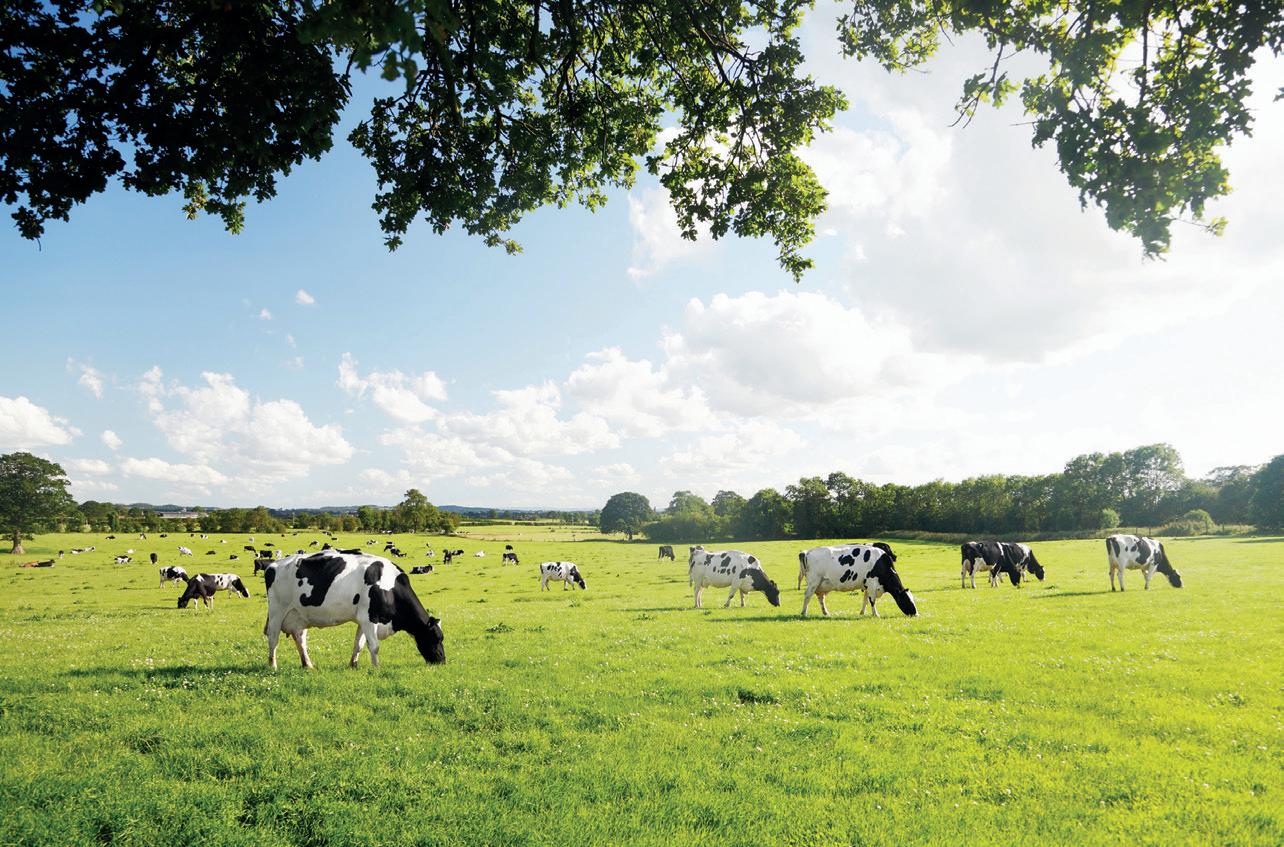




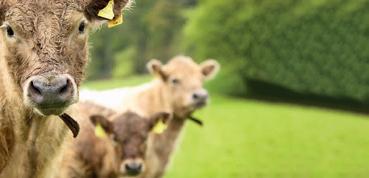

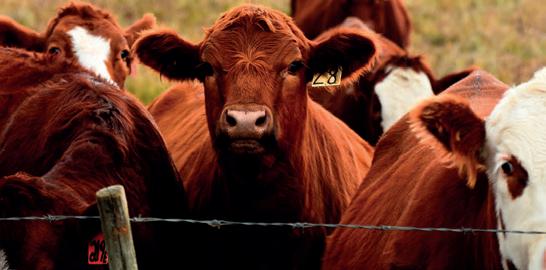


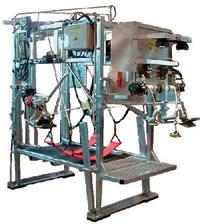
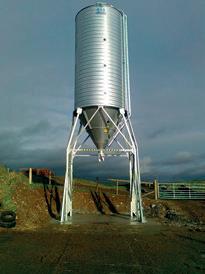



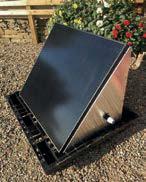
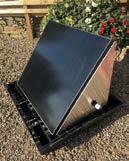

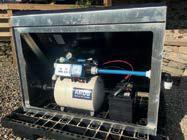
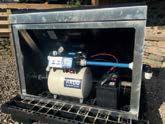


Not CCTV images of how you became victims!
01491 651229 www.uwatch.co.uk



Areas covered:Stirling, Clackmannanshire, South Perthshire, West Fife, West Lothian, North Glasgow

A friendly, experienced team of vets covering all Farm & Equine routine and emergencies, inc:-
• State of the art diagnostics
• In-house laboratory
• Microchipping
• Exports
• Discounted zonal days
• PD fertility & semen testing
• Dentistry
STIRLING: (01786) 430387 Falleninch Farm, Dumbarton Road, Stirling FK8 3AB
Danny Lewis - 01502 725 862 danny.lewis@micropress.co.uk
Mark Tait - 01502 725 803 mark.tait@micropress.co.uk
Mat Roffey - 01502 725 854 mat.roffey@micropress.co.uk



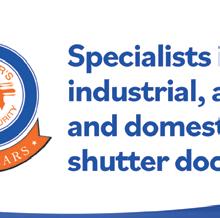



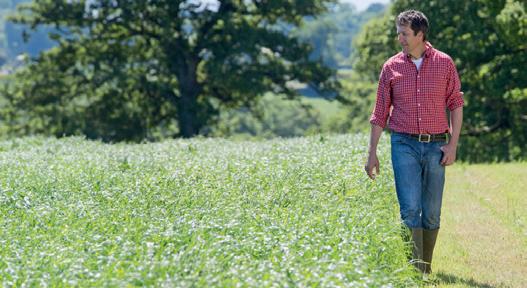
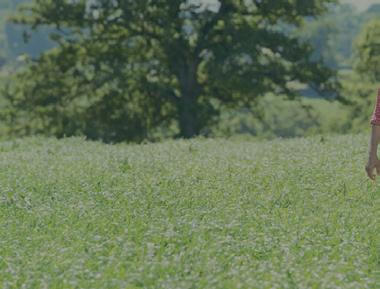



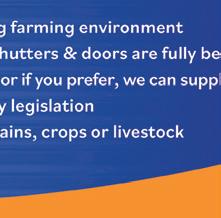










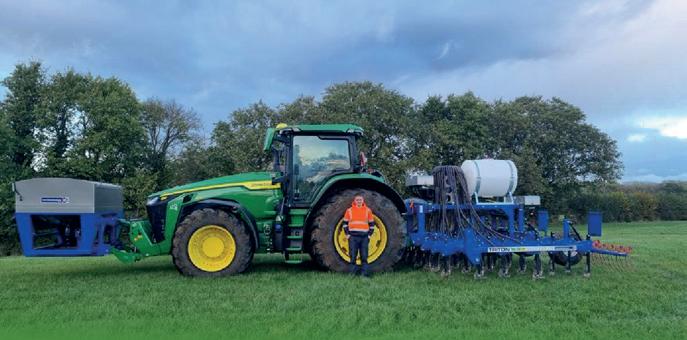

on a 700ha heavy clay farm at Hatley St George, Bedfordshire




labour and fuel costs. The Triton has allowed us to drop spring crops from Triton drill has exceeded our expectations with a reduction costs averaging 11tha which higher than we were getting from our previous and plough It to say the Triton drill clay effectively in any conditions
to drill later to grass.
labour and fuel costs. The Triton has allowed us to drop spring drilled crops from the rotation. The Triton drill has exceeded our expectations with a dramatic reduction in costs and with wheats averaging 11tha which is higher than we were getting from our previous heavy cultivation and plough system. It is true to say that the Triton will drill clay effectively in virtually any conditions and gives the confidence to drill wheat later to reduce black grass.
We purchased the Triton 6m drill in 2021 to replace heavy cultivations and reduce labour and fuel costs. The Triton has allowed us to maximise our winter wheat acreage and drop spring drilled crops from the rotation. The Triton drill has exceeded our expectations with a dramatic reduction in costs and with wheats averaging 11tha which is higher than we were getting from our previous heavy cultivation and plough system. It is true to say that the Triton will drill clay effectively in virtually any conditions and gives the confidence to drill wheat later to reduce black grass.
Twin hold roll pin blade removal system and backward leaning air borne upper blade for trash lift and ease of trash flow
Twin hold roll pin blade removal system and backward leaning air borne upper blade for trash lift and ease of trash flow

Seed depth tail 40mm deep holding the seed
Seed depth tail 40mm deep holding the seed at correct depth and placing seed on either side of seed terrace
Seed depth tail 40mm deep holding the seed at correct depth and placing seed on either side of seed terrace

Next Generation Patented

from direct drilling. Six years later we are consistently achieving higher yields from the drill on the market that gives the flexibility to grow maximum profit autumn sown crops


claiming all weather capabilities – don't be caught out, get a demo against a Triton.
Triton launched its unique deep soil engagement direct drill in 2018 to give plough based yields from direct drilling. Six years later we are consistently achieving higher yields from the Triton than from ploughed trials on our own land. The Triton is the only all weather seed drill on the market that gives the flexibility to grow maximum profit autumn sown crops whilst reducing blackgrass from late drilling. A number of other manufacturers are now claiming all weather capabilities – don't be caught out, get a demo against a Triton.
Triton launched its unique deep soil engagement direct drill in 2018 to give plough based yields from direct drilling. Six years later we are consistently achieving higher yields from the Triton than from ploughed trials on our own land. The Triton is the only all weather seed drill on the market that gives the flexibility to grow maximum profit autumn sown crops whilst reducing blackgrass from late drilling. A number of other manufacturers are now claiming all weather capabilities – don't be caught out, get a demo against a Triton.
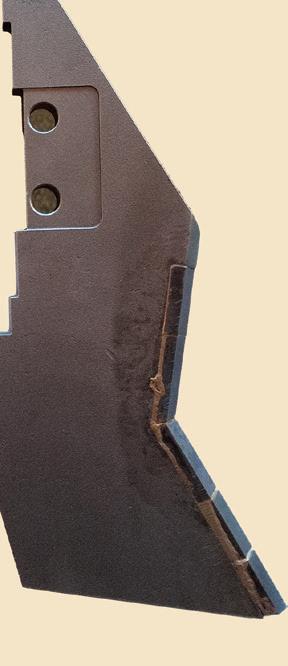
blade does not hook grass
Downward facing upper blade does not hook grass weed seed up from below stale seed bed and field surface
seed bed and field
Downward facing upper blade does not hook grass weed seed up from below stale seed bed and field surface
Triangular tungsten tiles for
Triangular tungsten tiles for reduced draught and soil disturbance
Triangular tungsten tiles for reduced draught and soil disturbance



SURFACE
Drilling at 40mm depth
Downward
Drilling at 40mm depth
field surface
Drilling at 14cm deep lower blade takes blade deep below ground for air drainage and rooting Downward
Downward facing upper blade holds field surface in place minimising soil eruption in the stale seed bed
stale seed bed
Downward facing upper blade holds field surface in place minimising soil eruption in the stale seed bed
14cm deep lower blade takes blade deep below ground for air drainage and rooting
14cm deep lower blade takes blade deep below ground for air drainage and rooting
Triton UK: 01223 891888 (East Anglia & Midlands)
Triton North & Scotland: 07712 831718 (Steve) (S.T. Gowan Agri) Southern agent: 07970 549012 (Richard Peck)
Triton UK: 01223 891888 (East Anglia & Midlands)
Triton North & Scotland: 07712 831718 (Steve) (S.T. Gowan Agri)
& Scotland: 07712 831718 (Steve) (S.T. Gowan Agri)
Abington Farm Park, Great Abington, Cambridgeshire CB21 6AX
Abington Farm Park, Great Abington, Cambridgeshire CB21 6AX
www.tritonseeddrills.com
www.tritonseeddrills.com
From its unmistakable Buckbootz ‘Hard As Nails’ profile to its rugged good looking dealer boot styling B1180 carries its Buckbootz heritage and branding with pride. With its extended whole cut vamp and beefy heel counter this is a waterproof safety boot with gravitas and real substance.
Using construction and components designed to withstand the roughest treatment, B1180 combines strength with light weight thanks to an aluminium toecap, kevlar midsole and the new Buckbootz K11 dual density sole. K11 lets us retain all the legendary Buckbootz rubber outsole durability and features which now include ladder grips, at a weight saving which will win over a new generation of Goodyear welted safety boot wearers. With Buckbootz characteristic attention to detail we lock stitch the toe plate and beef up the outer sole rubber depth at the critical heel/ground
contact area. B1180
also brings three dimensional Buckflex fitting with three flex-stretch areas at the boot collar. This makes fitting and removal a stroll in the park and enables the collar to retain its neat look and snug fit at all times.

• Lightweight Dealer boot
• Dark Brown Crazy Horse Leather
• Waterproof
• EN/UKCA safety codes SB PS HRO FO LG WR/WPA
• Aluminium safety toecap
• Non-metallic anti penetration NAIL STOP midsole
• Slip resistant
• Heat (300ºC/60 secs) and Oil Resistant Rubber Outsole with Ladder Grips
• K11 dual density weight saving sole
• Wider fitting at toe area
• Buckflex three way flex-stretch collar
• Sizes 6/40 to 13/47

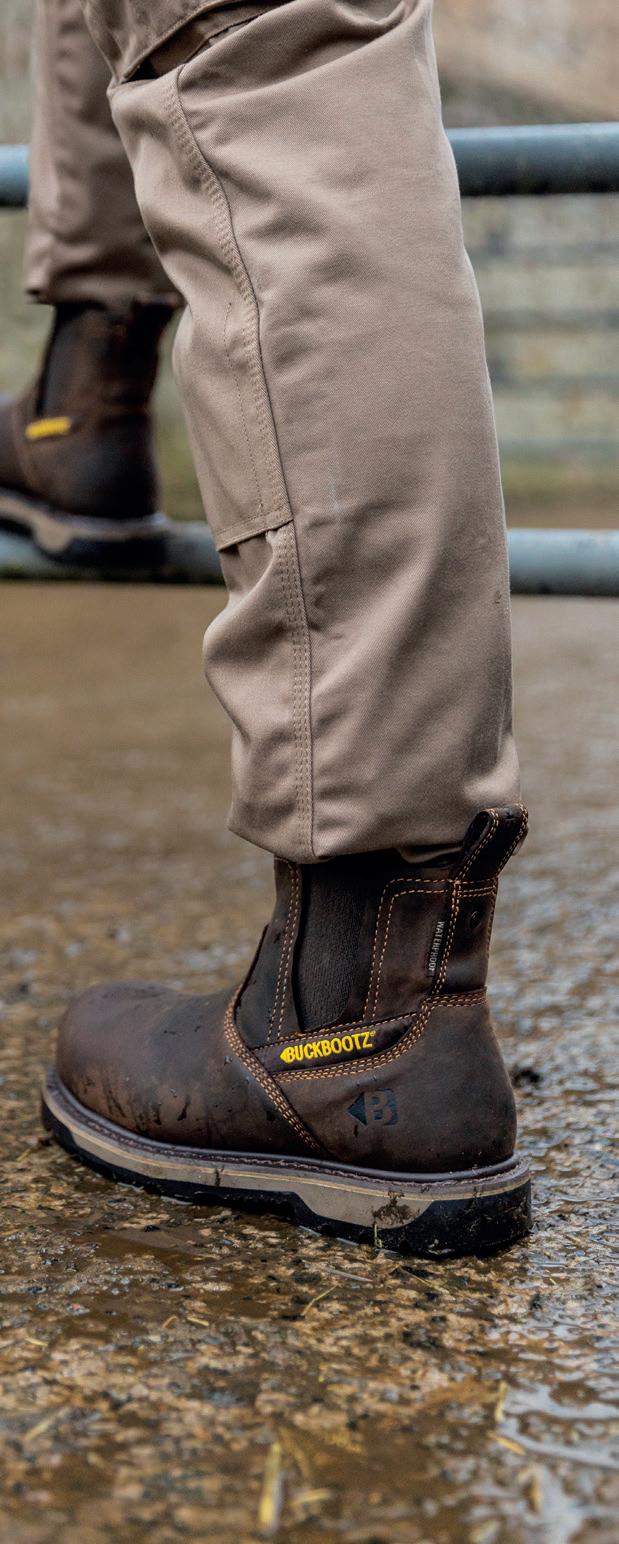
To find your nearest Agricultural Merchant stockist call 01382 82 82 00 or email info@buckbootz.com